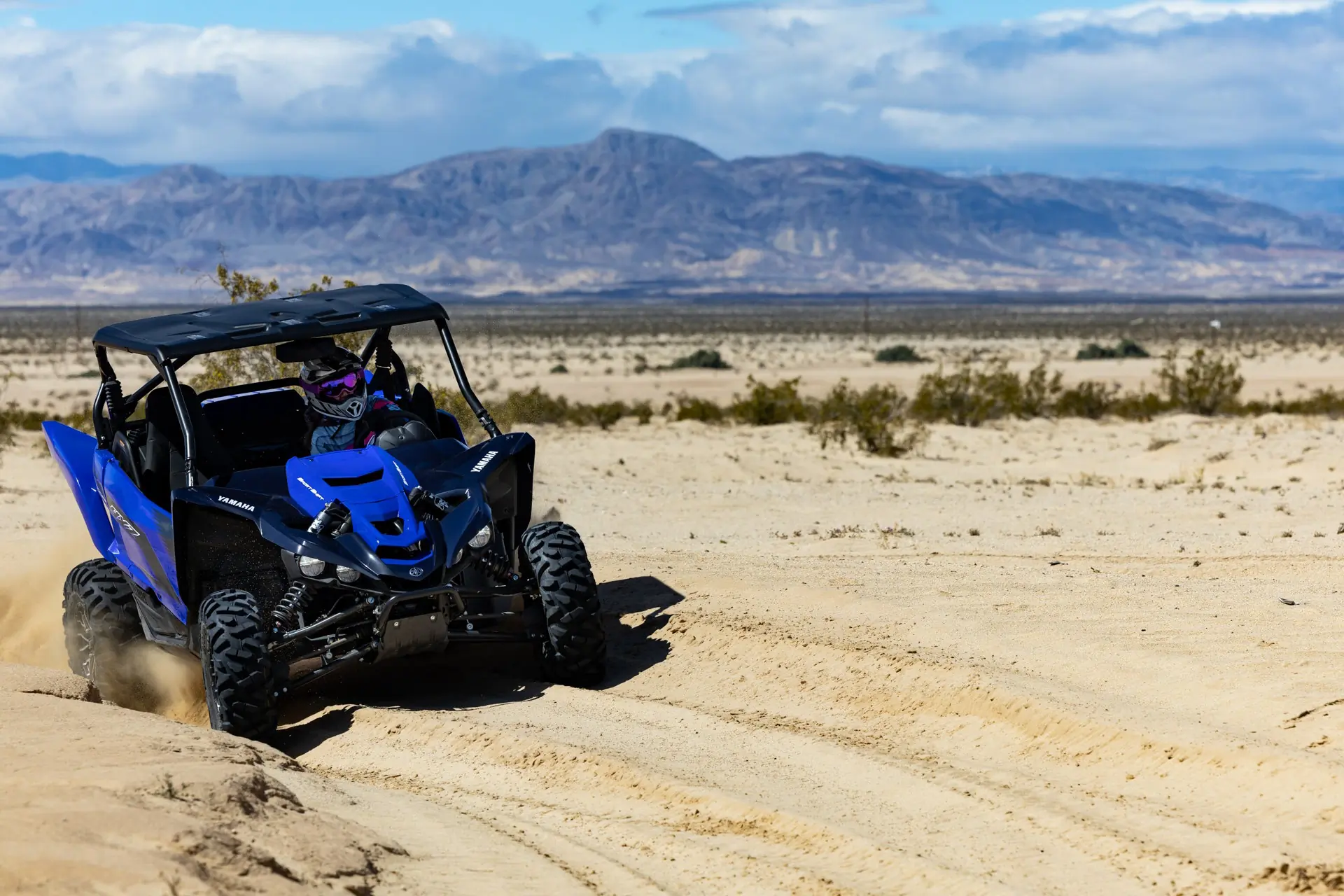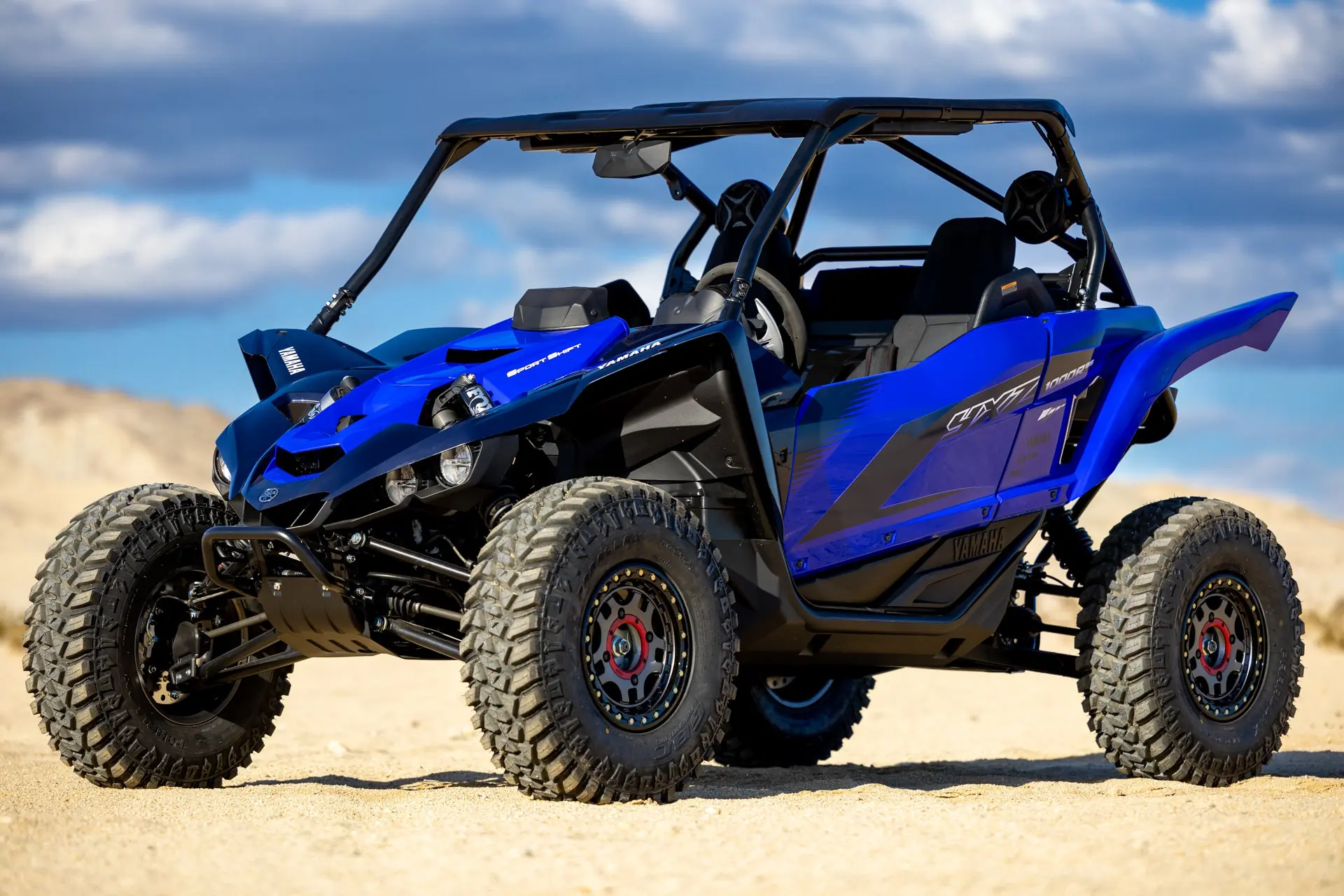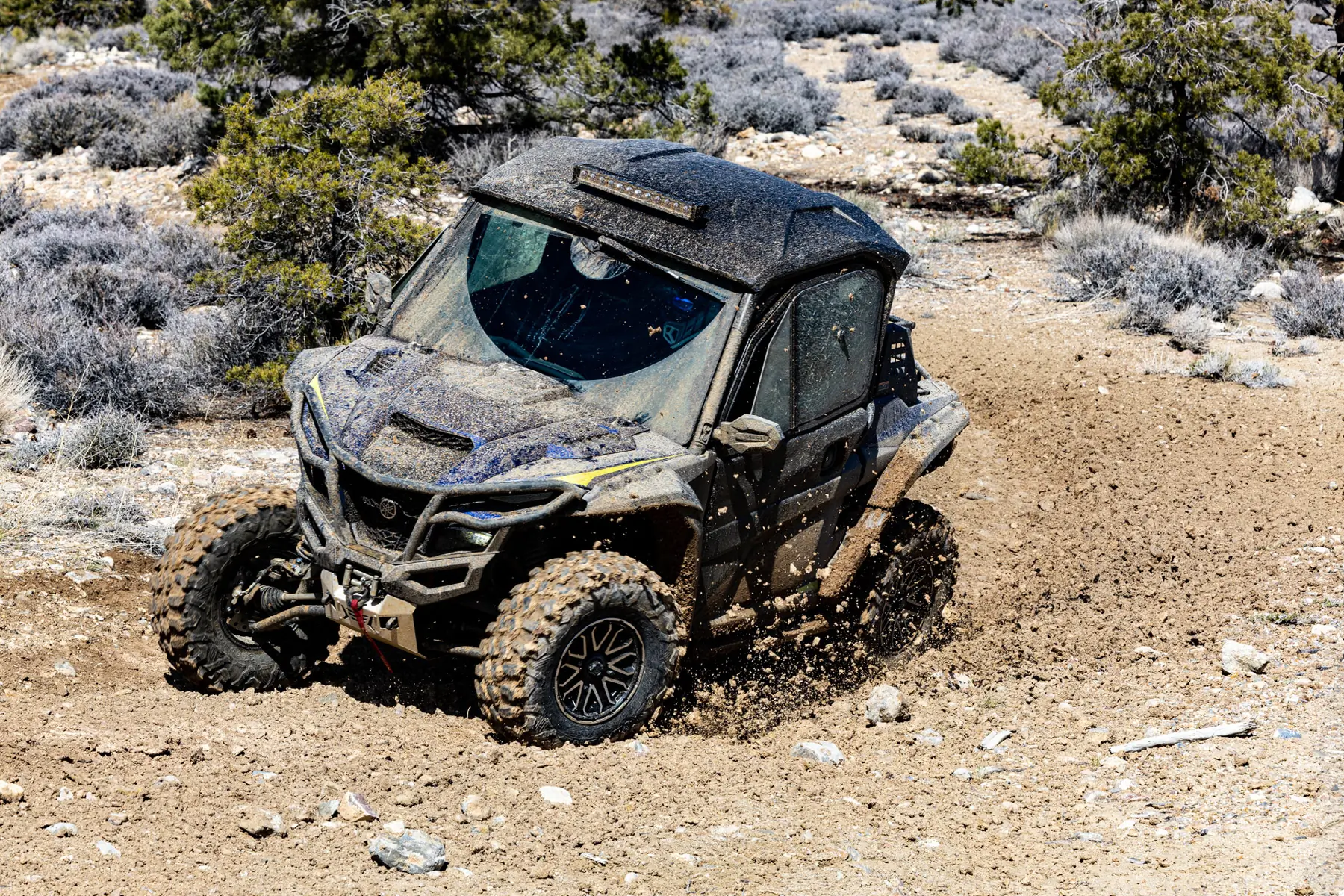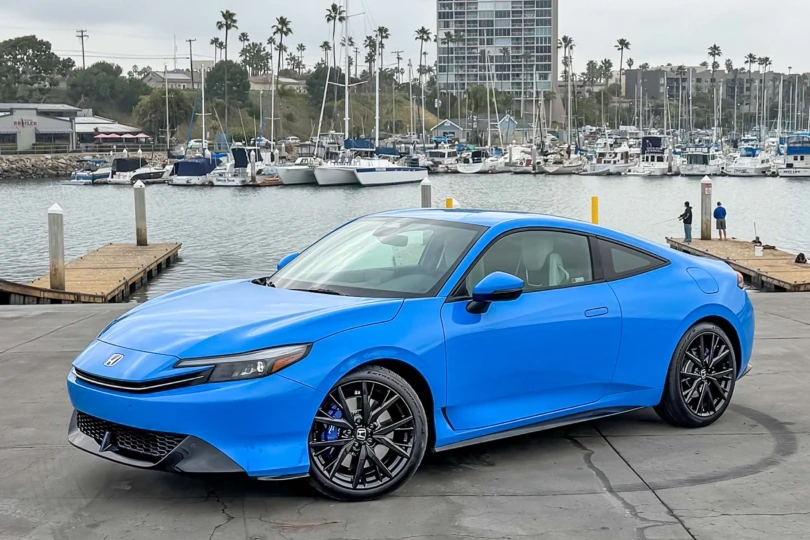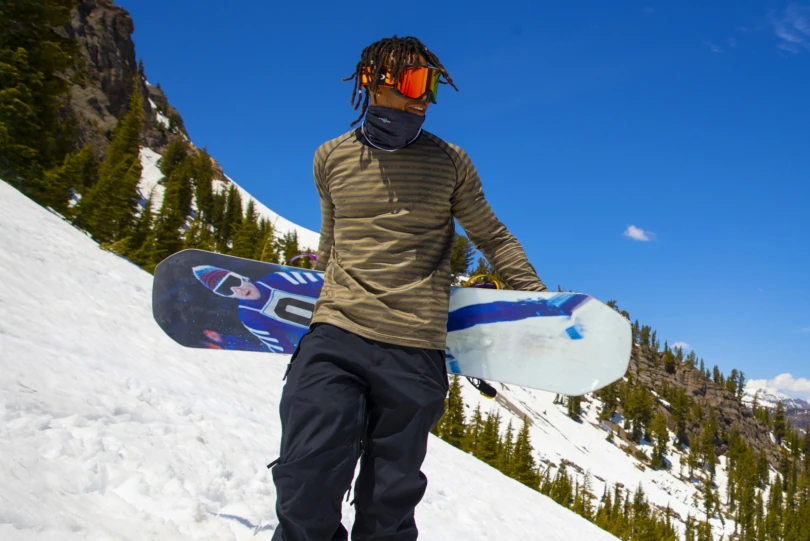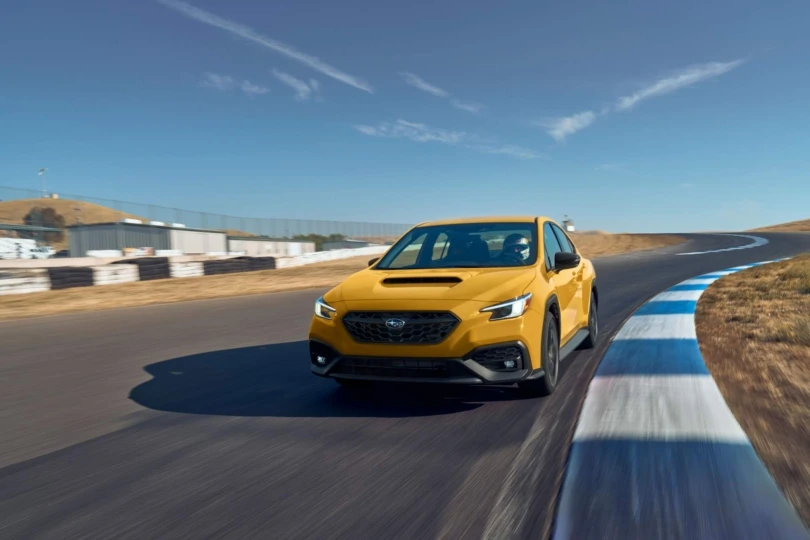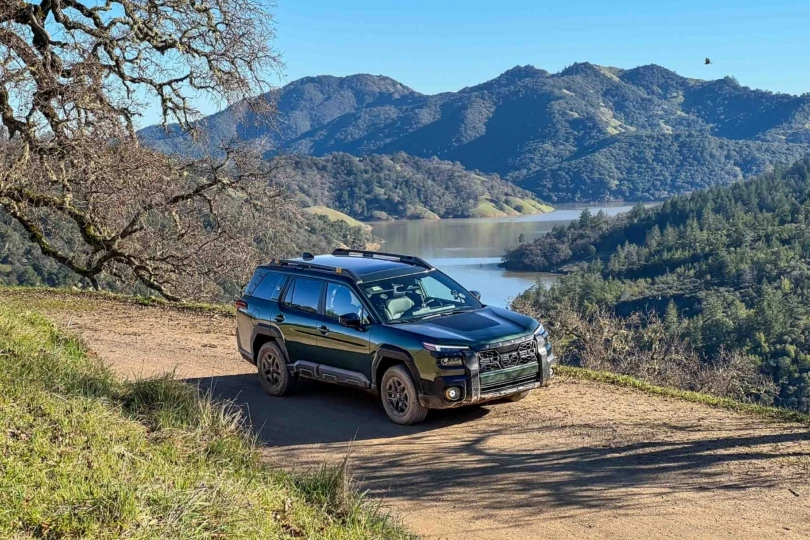Ideal for recreationalists and pure sport enthusiasts, the 2023 YXZ 1000R SS (Sport Shift) is a whole lot of UTV. I had the opportunity to drive one through the iconic testing grounds of Superstition in El Centro, Calif., where rocks and sand dunes are the perfect mix of fun and challenge.
In a world of automatic everything, it was liberating to feel in control of my drive again when using the paddle shifters to gear up and down. And I didn’t need to take my foot off the gas to do so.
In short: Even a sore neck couldn’t wipe the smile off my face while driving the YXZ 1000R SS. I was told to take it to 11 (actually it redlines at 10,500) and I did. For me, the comfort factor went down when driving the YXZ over 45 mph, though, and there can be a learning curve if you’re coming from an automatic-style UTV.
- Displacement: 998cc
- Engine: DOHC, liquid-cooled, inline 3-cylinder; 12-valve
- Front suspension: FOX 2.5 Podium; 16.2" travel
- Rear suspension: FOX 2.5 Podium; 17-inch travel
- Front brakes: dual hydraulic discs; 255mm
- Rear brakes: dual hydraulic discs; 245mm
- Front tires: 29 x 9.00R-14 Maxxis Bighorn
- Rear tires: 29 x 11.00R-14 Maxxis Bighorn
- Wheelbase: 90.5"
- Ground clearance: 13.2"
- Wet weight: 1,523 lbs.
- Cargo rack capacity: 300 lbs.
- Fuel capacity: 9 gal.
Pros
- High redline point
- Manual transmission
- On-Command drive system
Cons
- Cockpit could use more adjustability for shorter folks
- Not as smooth as the automatic transmission
2023 Yamaha YXZ1000R SS Review
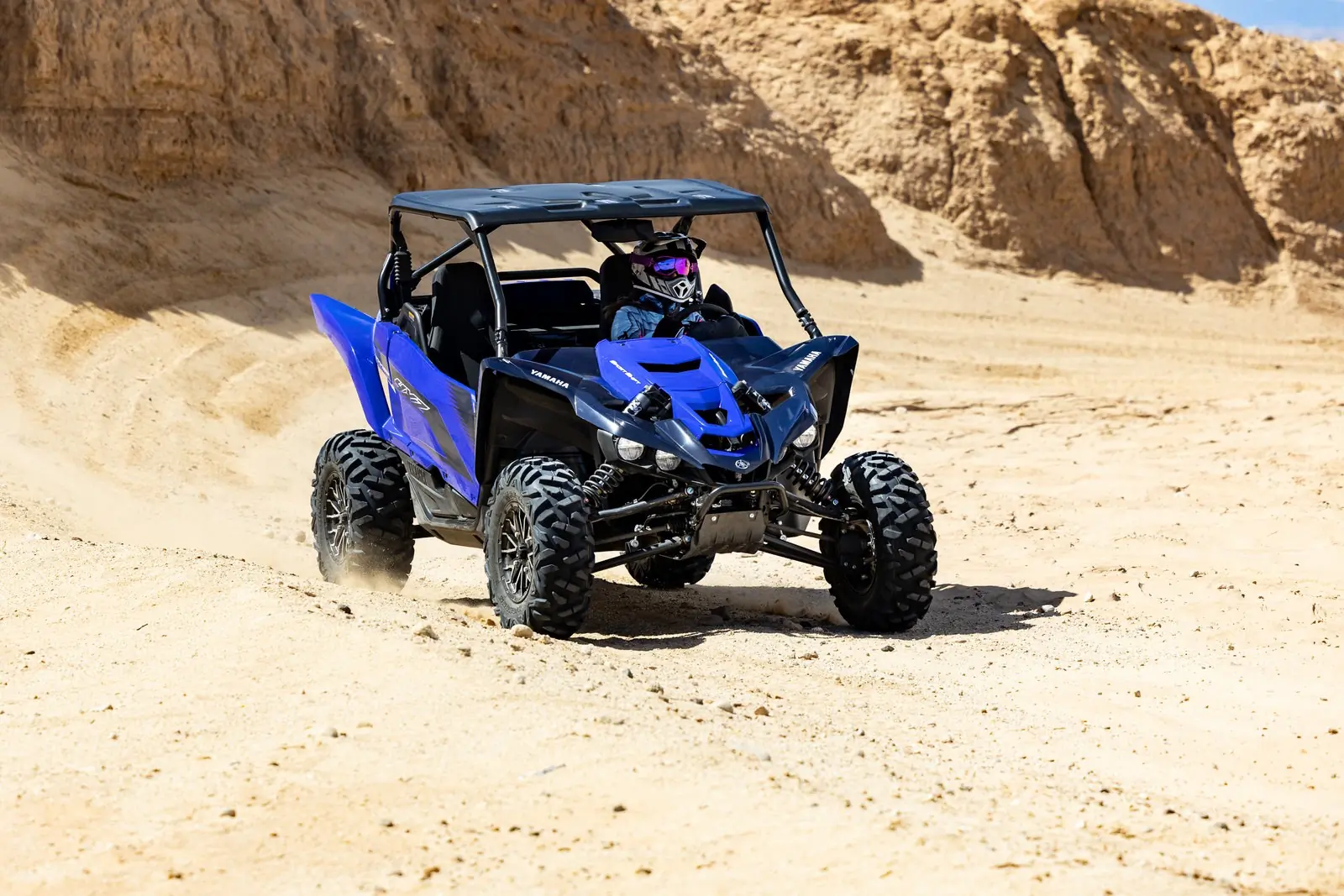
Strapping into the two-way adjustable, three-point harness, I got ready to hit the sand dunes and find out more about the 2023 YXZ1000R SS.
Yamaha did most of its changes to the YXZ in 2019, which carry through to the 2023 model year. Some of the most significant were repositioning the radiator at the rear, increasing the tire size, dropping the hood angle, and raising the suntop 3.6 inches.
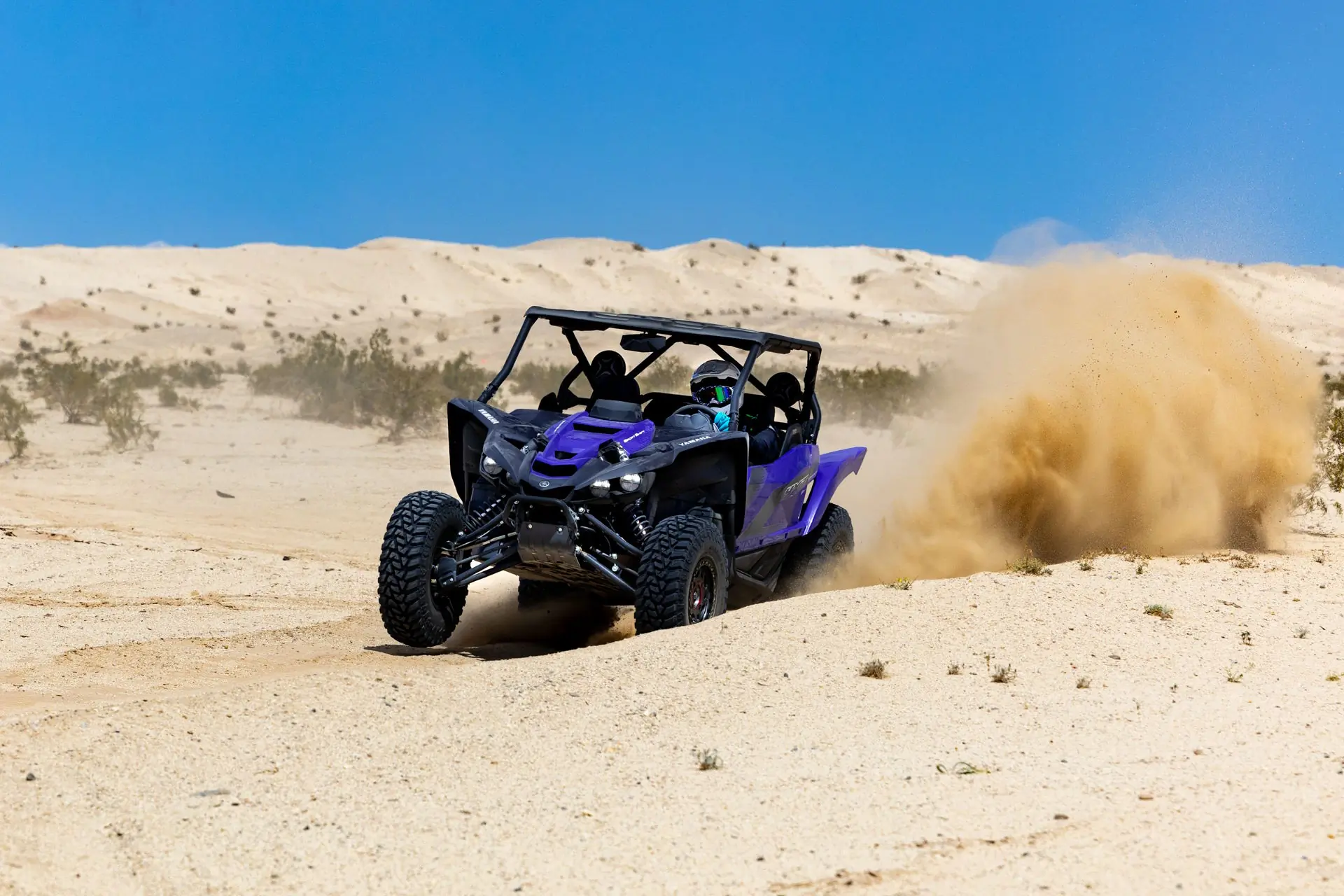
New for 2023, Yamaha has a Genuine Yamaha Technology Racing (GYTR) Turbo Kit with impressive features like a 60% peak power increase over stock, heightened “turbo whistle,” a preprogrammed, plug-and-play ECU, tool-free air filter access, and a lot more. The turbo kit adds about 75 pounds to the vehicle.
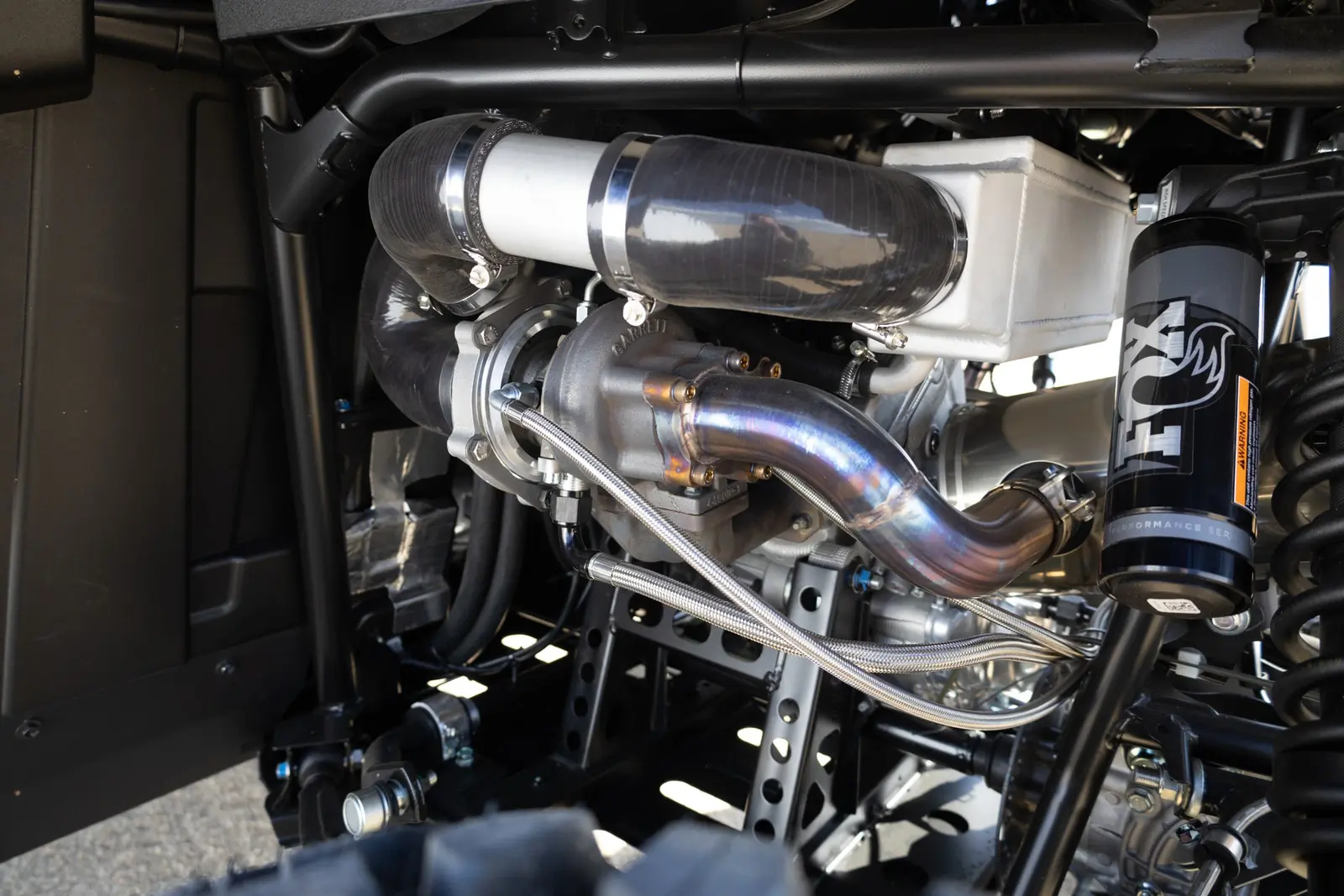



All 2023 YXZ1000R SS models are compatible with Yamaha’s GYTR Turbo Kit, which utilizes a Garrett GT2554R turbo.
I didn’t get a chance to drive the Turbo model, so this review will focus on the YXZ1000R SS attributes. But I will include the Turbo Kit information below. It is such a desired and ubiquitous optional upgrade that many dealers preinstall it on their inventory. It, of course, ups the price as well; more on that later.
2023 YXZ1000R SS Engine & Transmission
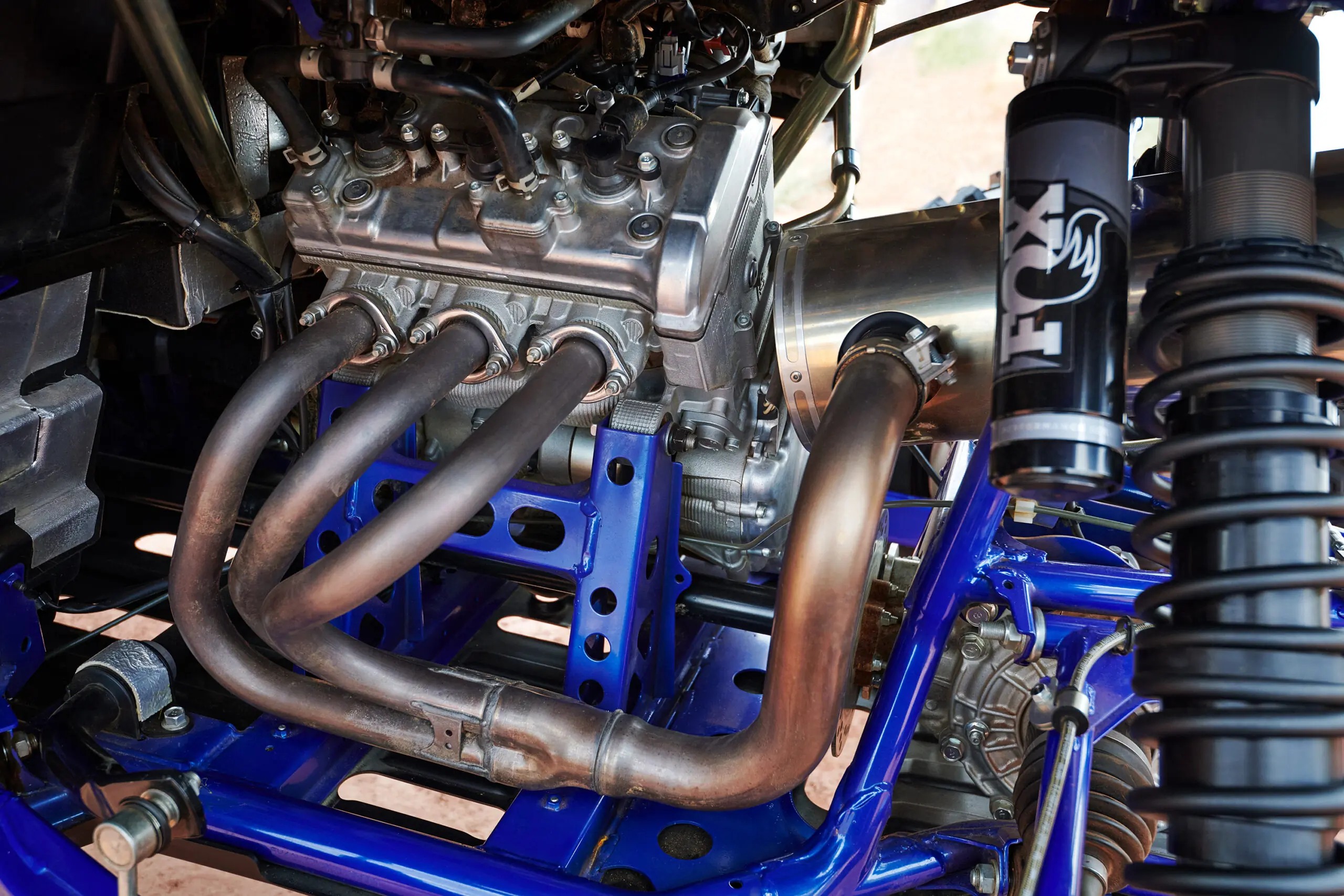



Perhaps one of the best features of the YXZ is its sequential five-speed manual transmission. The paddles themselves stay put, even when turning the steering wheel. I quickly got used to feeling for them without having to look down and easily switched gears with my pinky.
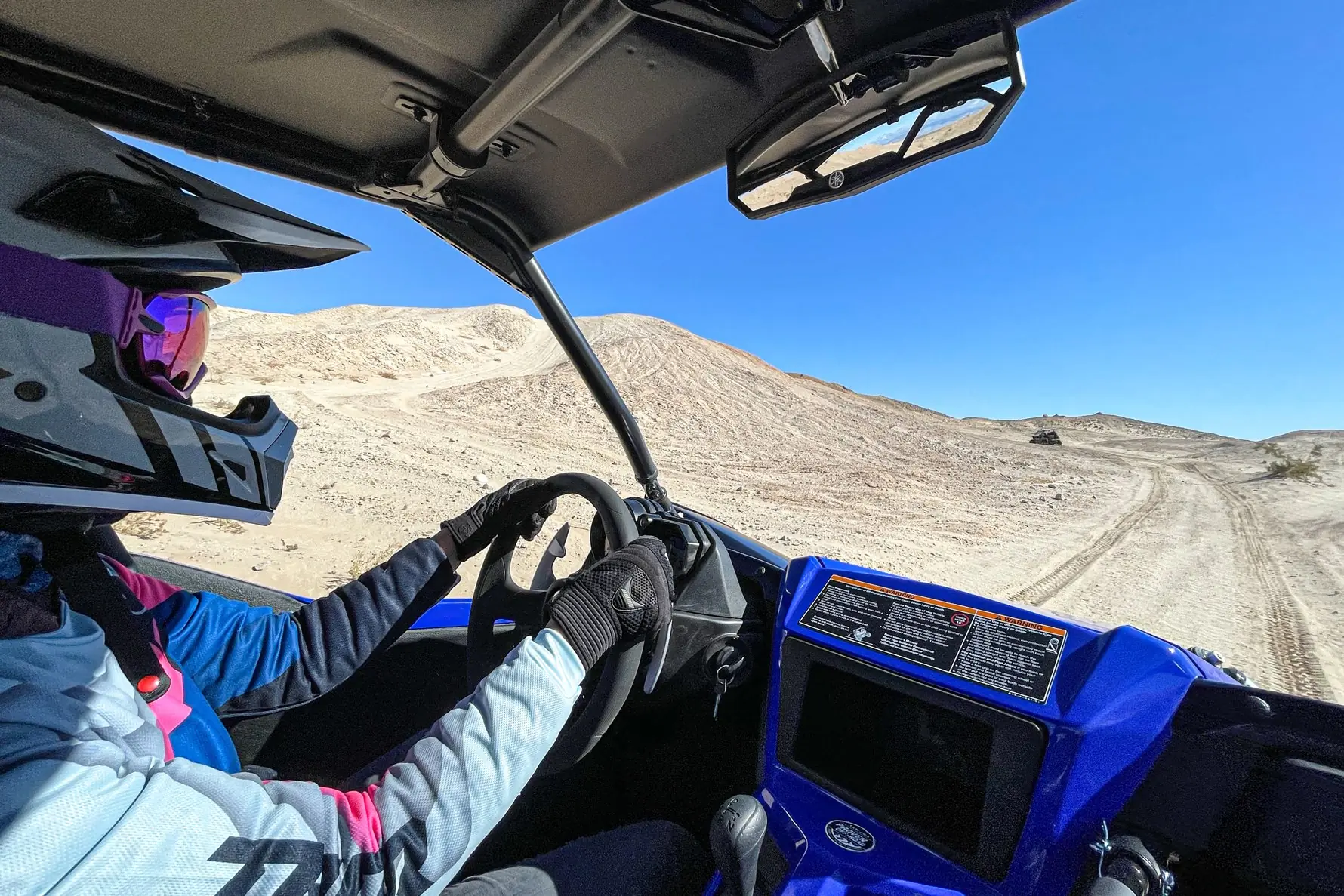



Drivers don’t have to remove a foot from the gas to up- or downshift. It’s quite exhilarating — especially hearing that 998cc triple-cylinder engine whistling at an exciting 10,500 rpm redline.
I was in the SS, which stands for Sport Shift. The SS has an auto clutch and aluminum paddles mounted to the steering column.
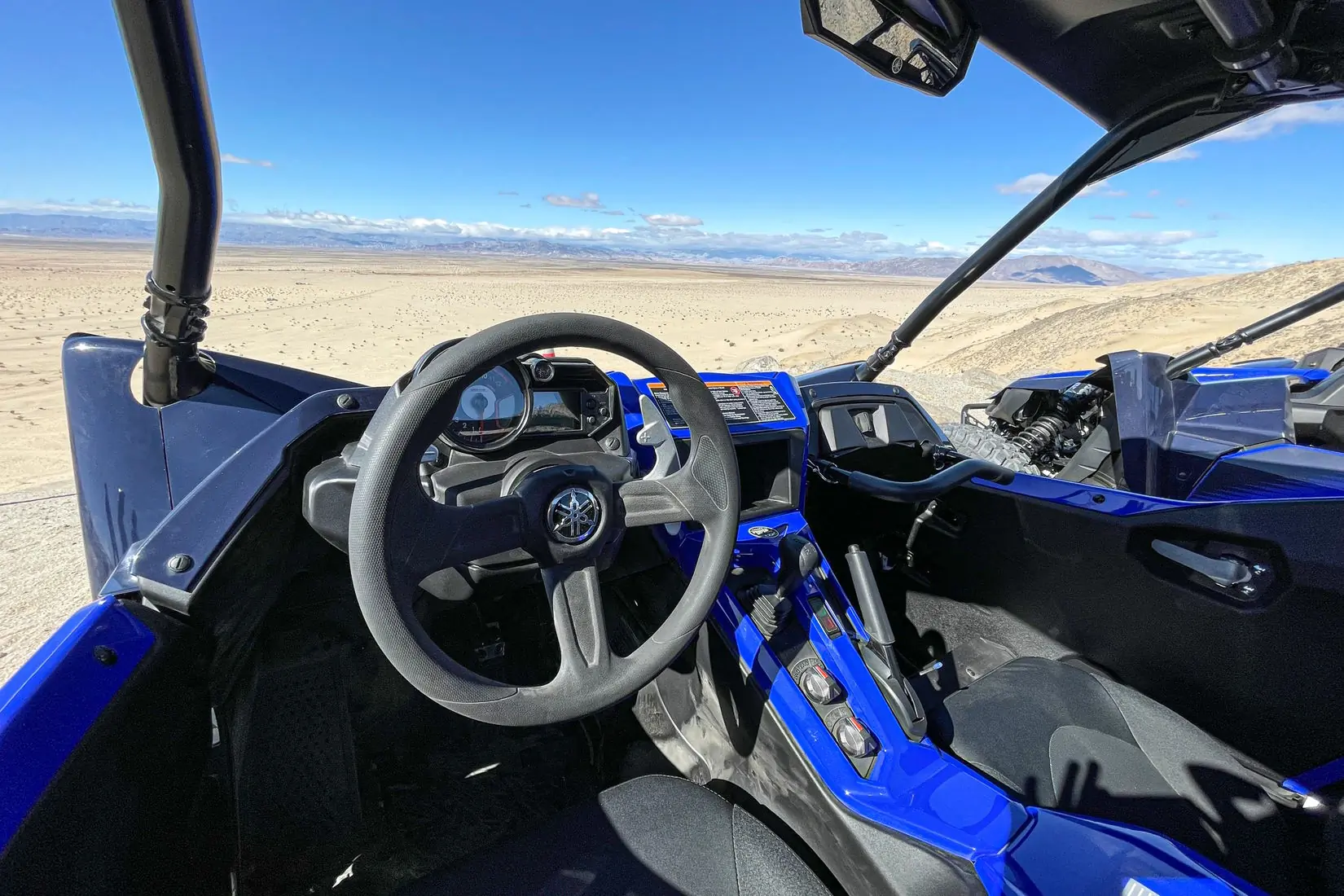



There is also a model on offer with an old-school clutch pedal and center console shifter for more of an analog feel.
World-Class Engine Braking
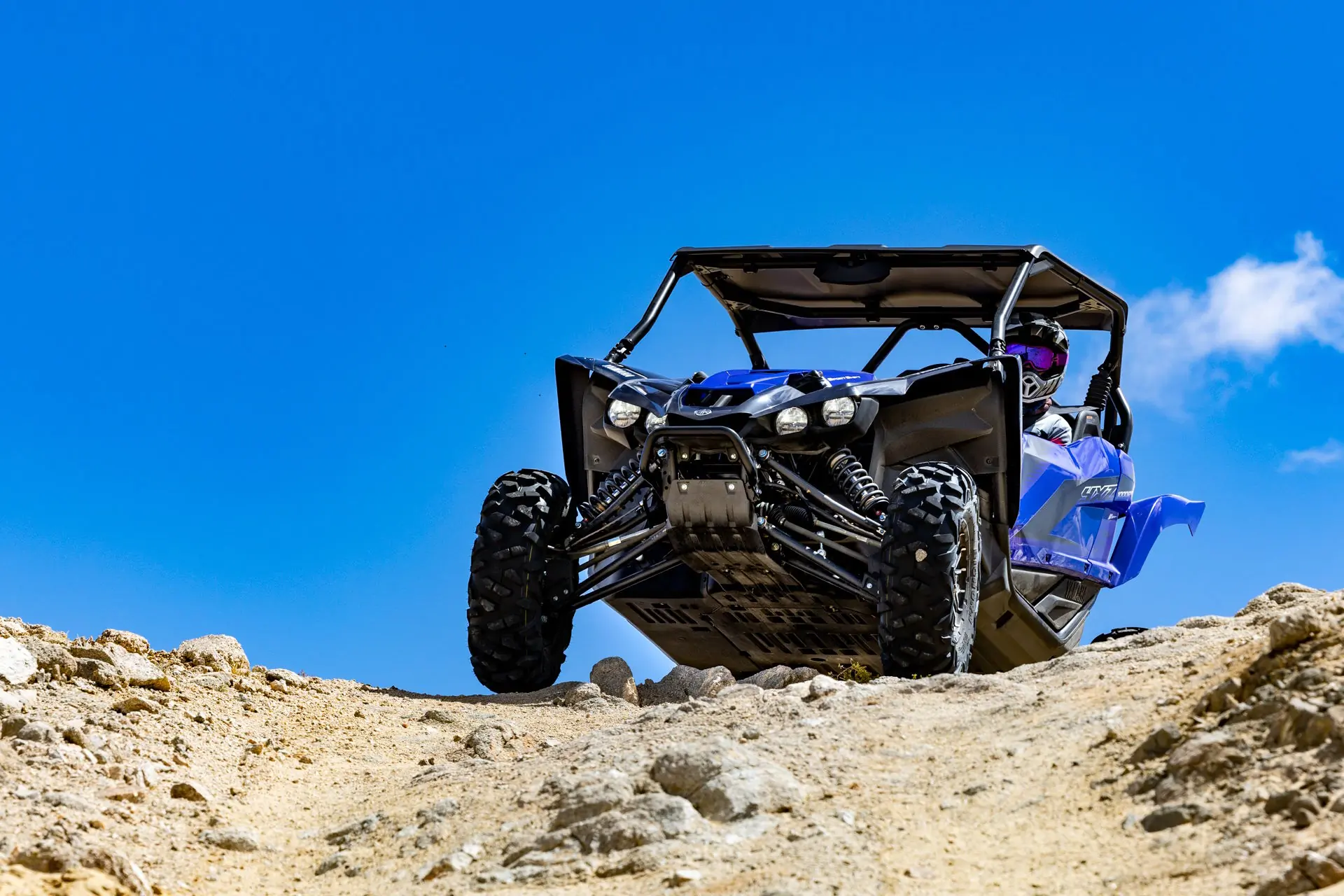



The YXZ engine braking system is top-notch. Other CVT systems can feel disconcerting when they disengage once getting into that lower rpm stage — almost like it pops out of gear.
Also, with other UTVs, you may only get engine braking on the rear wheels, which puts all the weight on the front of the machine. If there’s any loss of traction, you’ll start to lock wheels.
All Yamahas maintain that natural braking feel. The YXZ has a sprag clutch in the drive line, which allows the transmission to change gears smoothly under tension, and its four-wheel-drive system doesn’t disengage. Like a motorcycle, if you want more engine braking, just downshift.
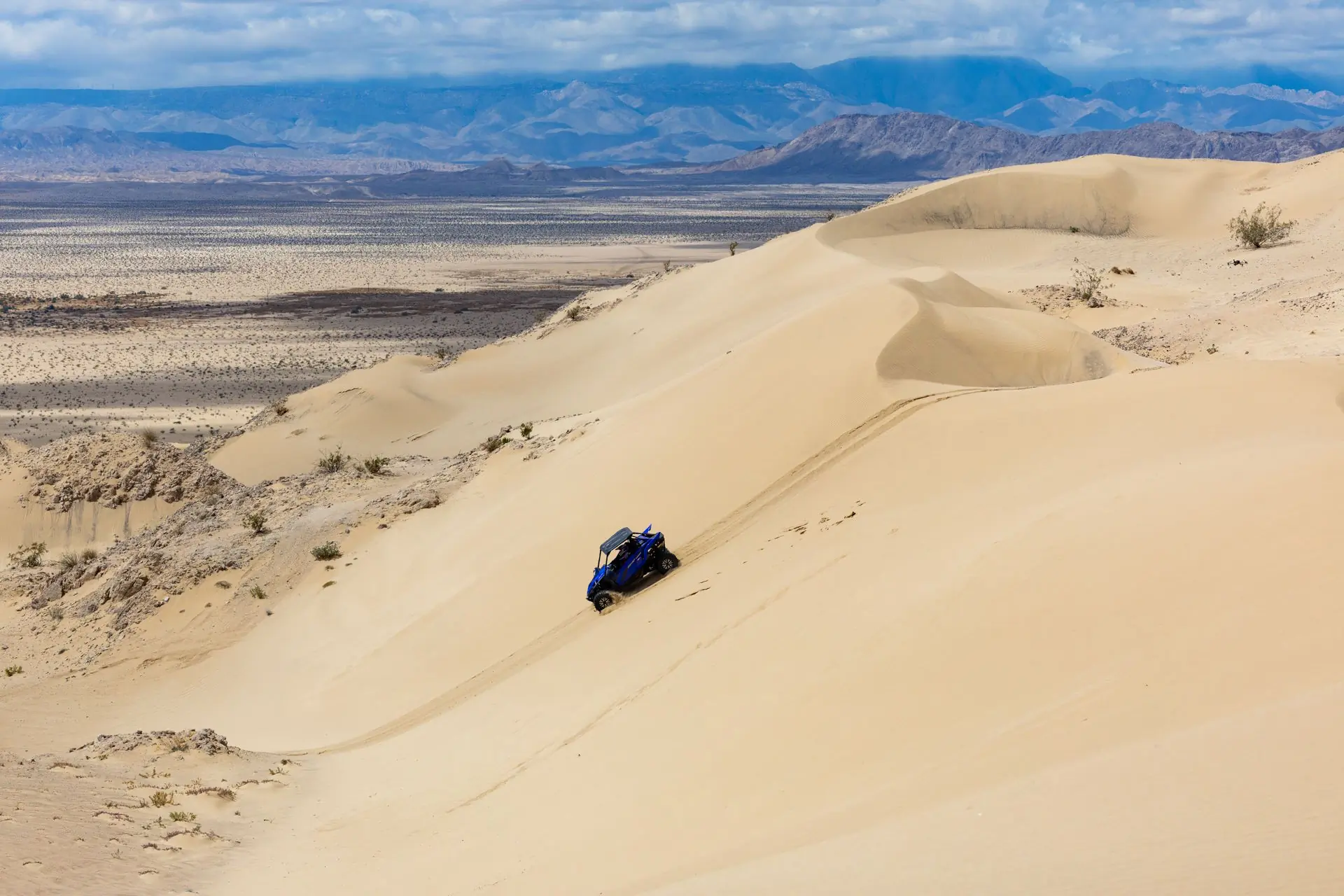



At the top of a steep dune, I let off the throttle, and gravity started pulling me down the hill. There’s always that peak moment when you wonder if you should apply the brake, but I let the machine do its thing.
The one-way bearing seamlessly reengaged the engine to the transmission, and I coasted down the dune without any concern for a rollover or wheel-lock.
Exclusive On-Command 4WD System
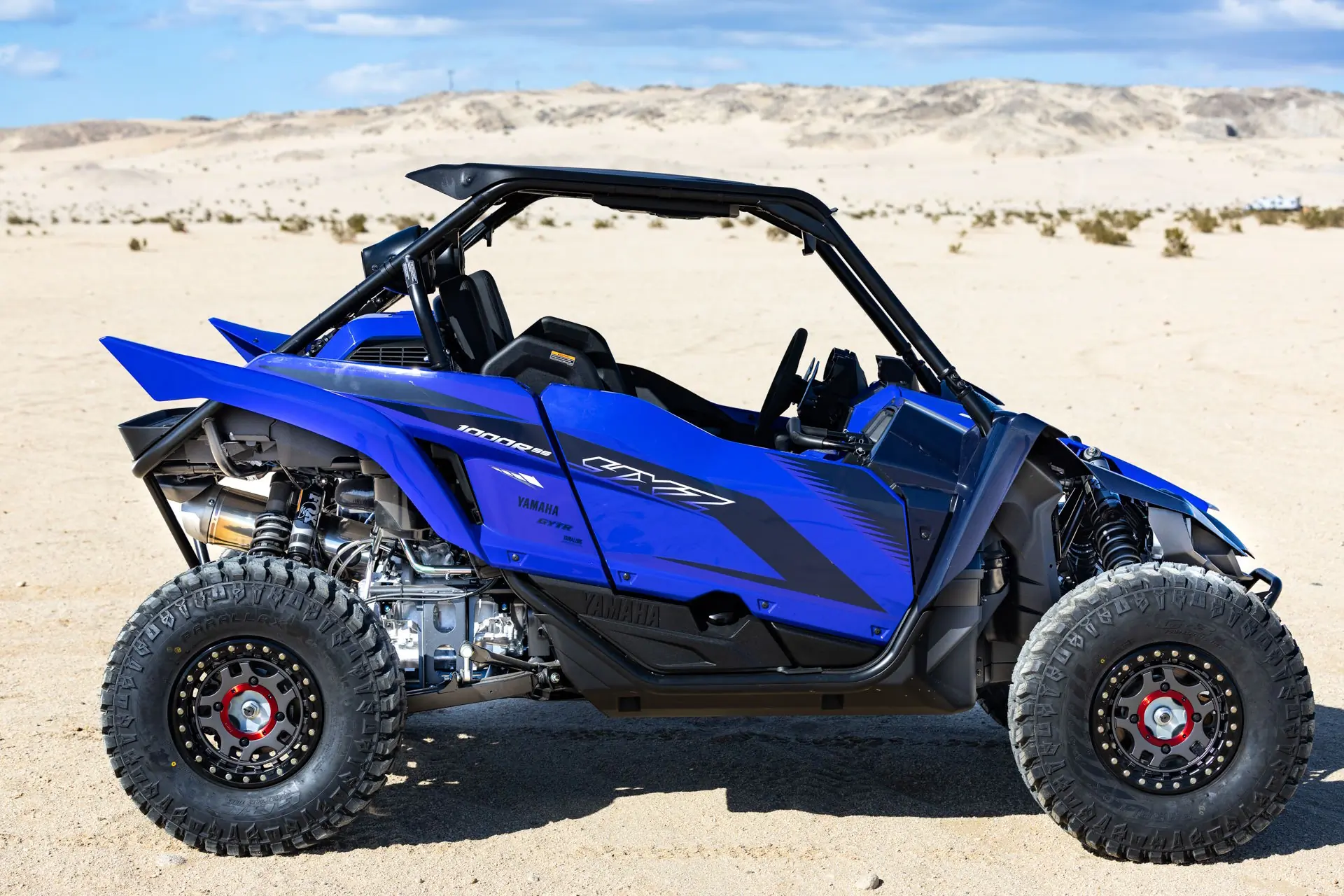



Yamaha’s exclusive On-Command 4WD system comes with 2WD, 4WD limited-slip, and 4WD differential lock modes. The system also has over-torque protection.
Yamaha’s goal with its industry-exclusive torque- and speed-sensitive Electric Power Steering (EPS) is to have the best balance of positive feedback — so, not making it so light or too subtle that it’s almost numb — and limiting negative feedback, like hitting rocks or ruts.
Cranking the steering wheel, I felt this assist, even at lower speeds.
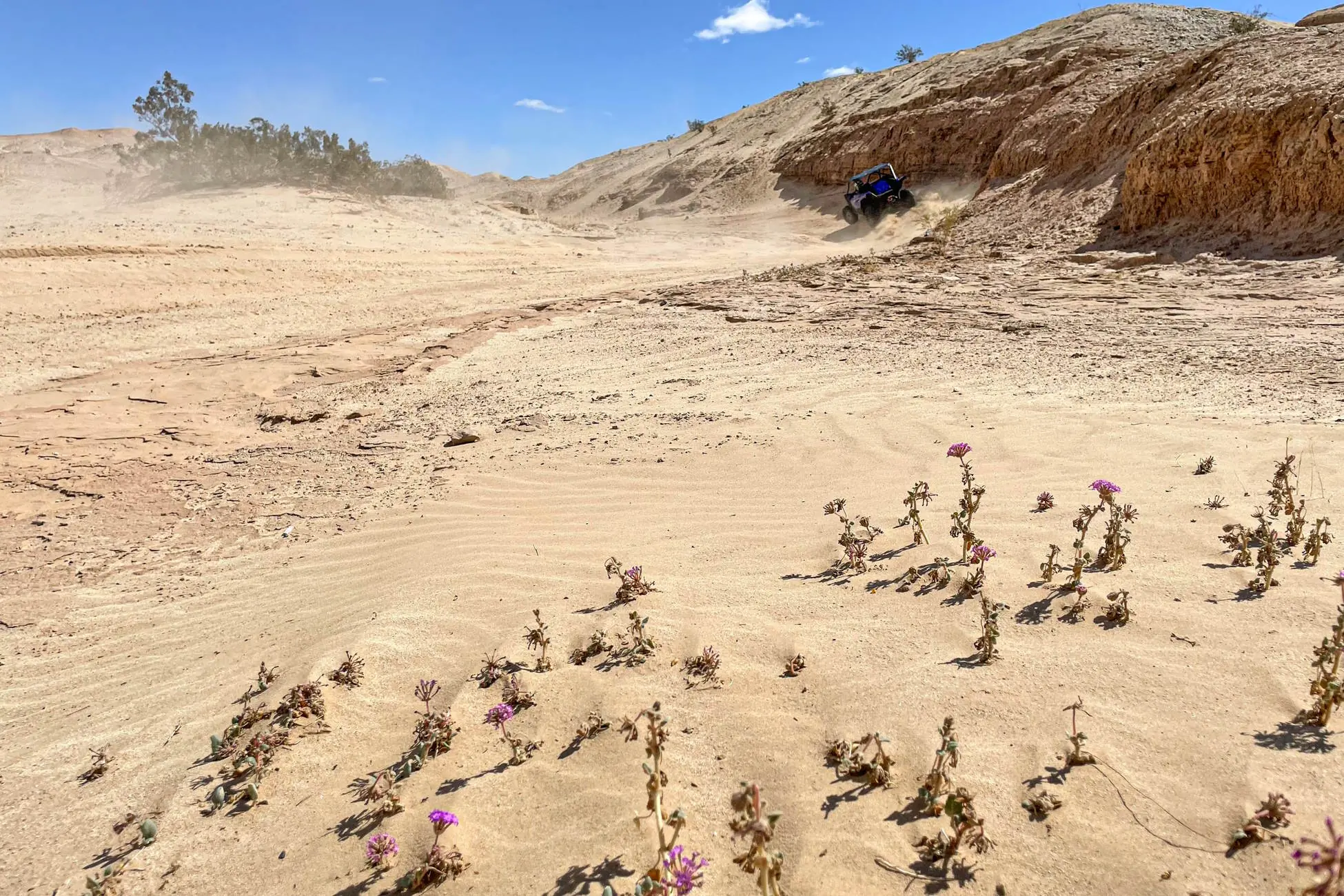



The fact that the 2019 models and up are lower to the ground also helps. Much of the terrain was off-camber and that lower center of gravity helped keep me confident I wasn’t leaning over too far.
2023 YXZ1000R SS Cockpit & Low-Angle Hood
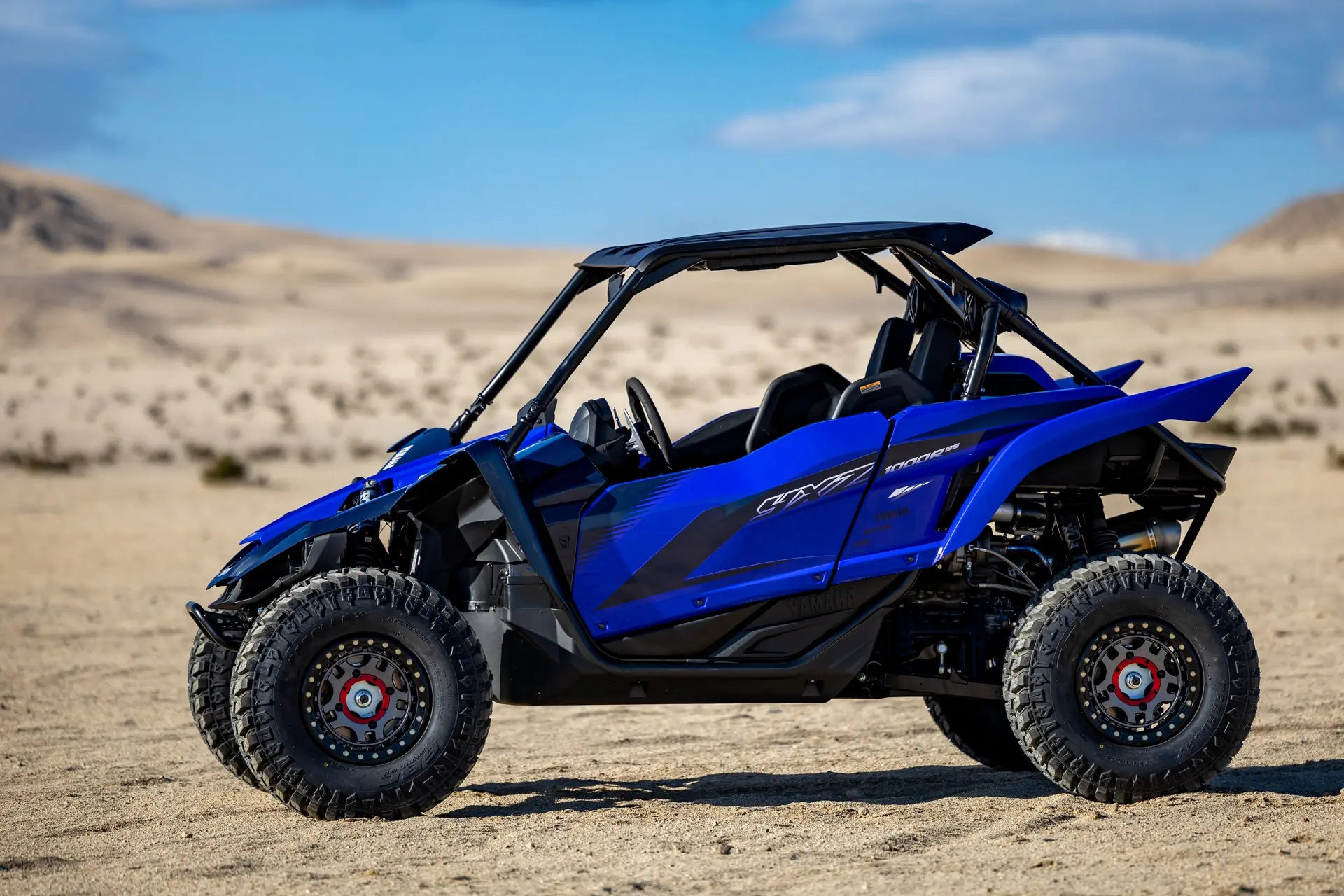



Yamaha put a lot of consideration into the design and shape of the cockpit’s seats and bolstering. One potential downside of sitting lower in the vehicle — especially if you’re short like me — is visibility.
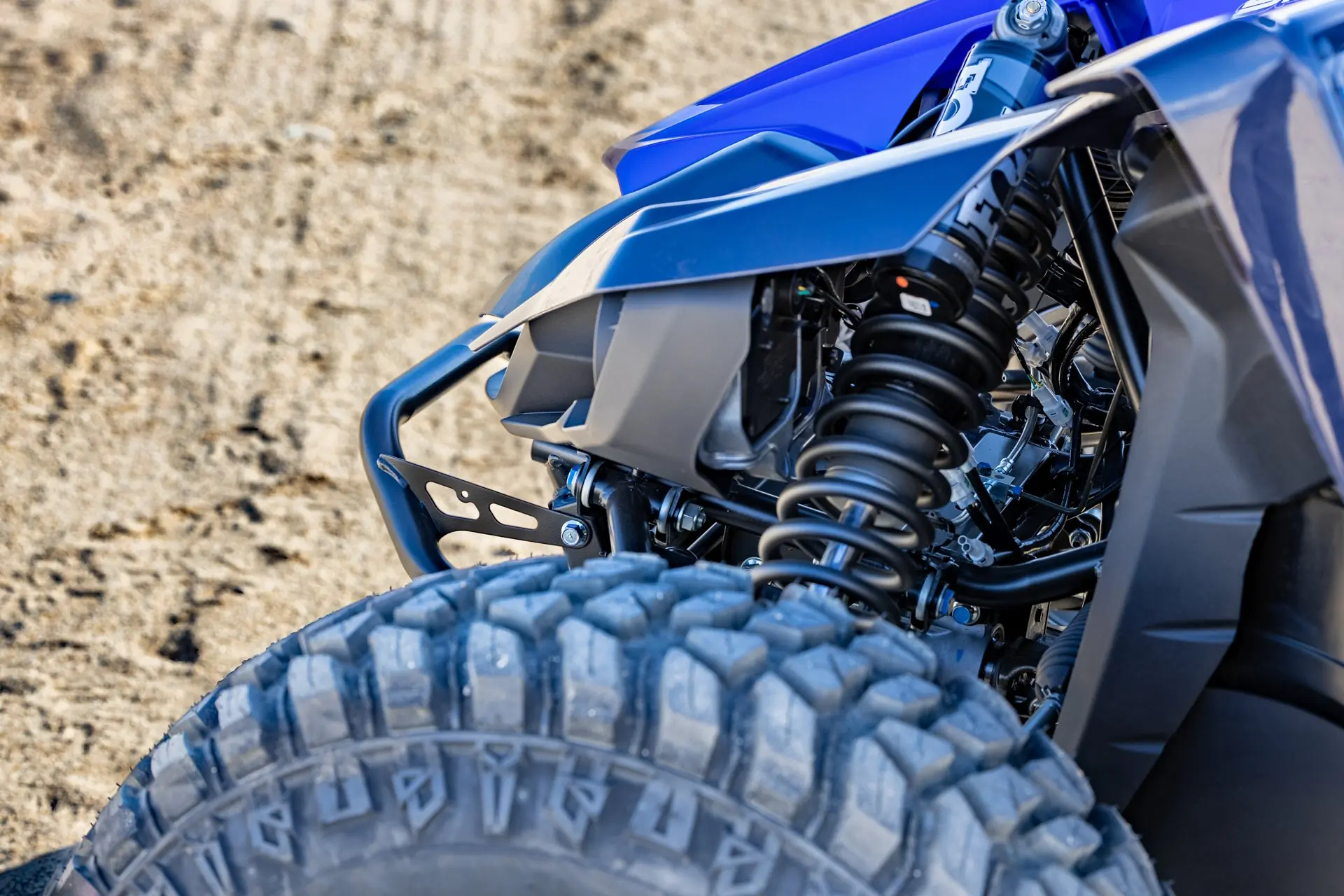



This is where the YXZ really stands out with a hood that slopes way down, out of your way. To accomplish this, Yamaha popped the fully adjustable FOX 2.5 Podium shocks out of the hood.
Also, pre-2019, the mounting for the suntop was lower — great for front visibility, but if you’re going down one hill and trying to look up the next, the suntop obscured that view.
The 2019 models and up now have a taller suntop by 3.6 inches. I didn’t find there were any significant behavioral changes due to the machine itself being a little taller.
That adjustment also improves ingress and egress convenience for taller folks.
Unique Cooling System
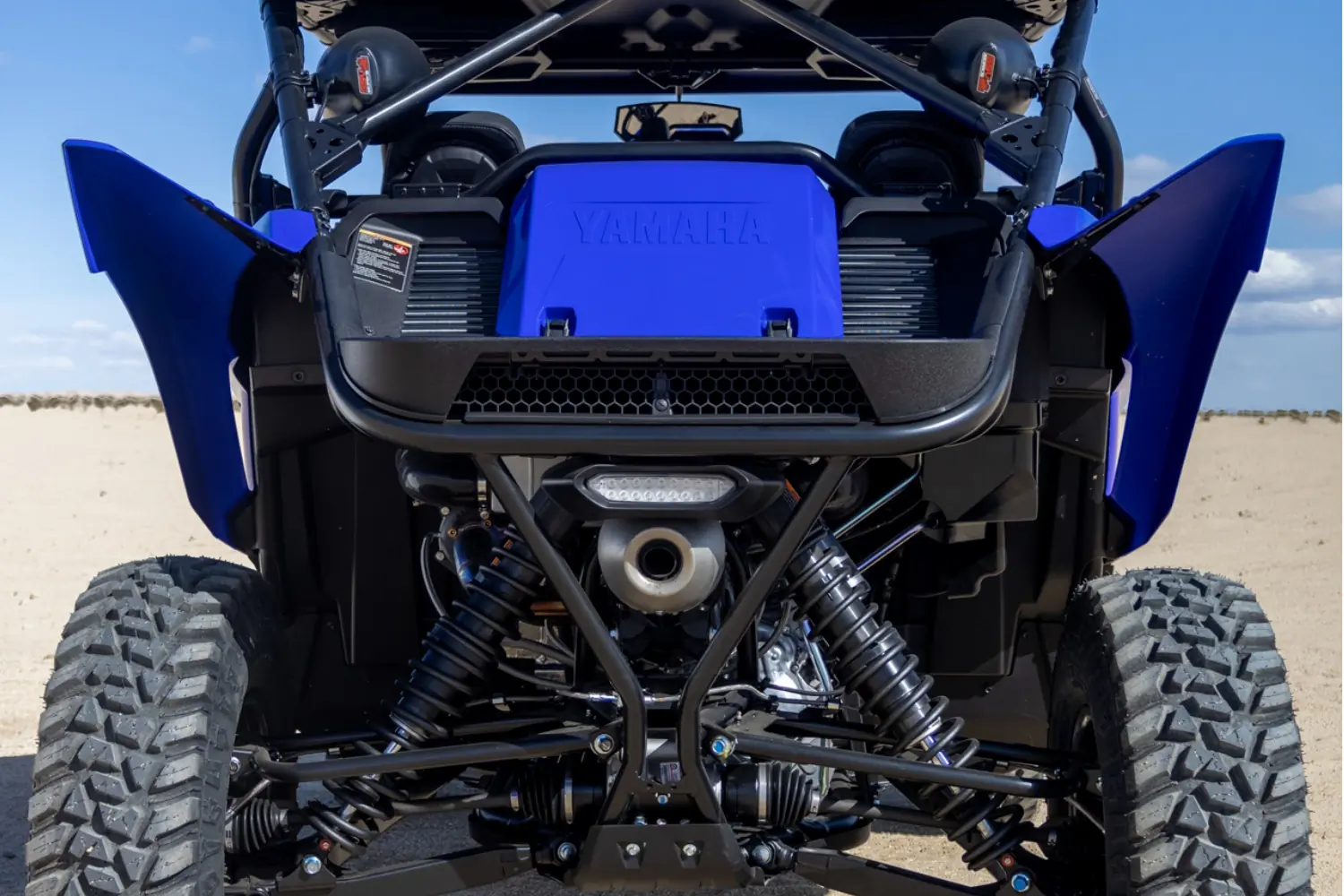



Earlier YXZ models had the radiator up front. Drivers found that position would pull hot air through the cab — not ideal for hot-day desert rides. Since Yamaha has full doors to help with mud and water splashing, that exacerbated the issue.
From 2019 on, Yamaha moved the radiator from the front to the back. There were many advantages to this.
First, the radiator got much bigger. It’s the biggest rad ever put on a Yamaha powersports vehicle. This immediately cooled down the cab and increased the cooling capacity, allowing it to handle the massive increase in power from the Turbo Kit, if you opted for that upgrade. Next, it’s far more difficult to get a radiator dirty when it’s on the back.
As for the rad layout, Yamaha offers an accessory windshield — which, when not in use, can fold up and sit on the suntop. When the windshield is in place, the cooling system still needs airflow, so Yamaha added multiple intakes.
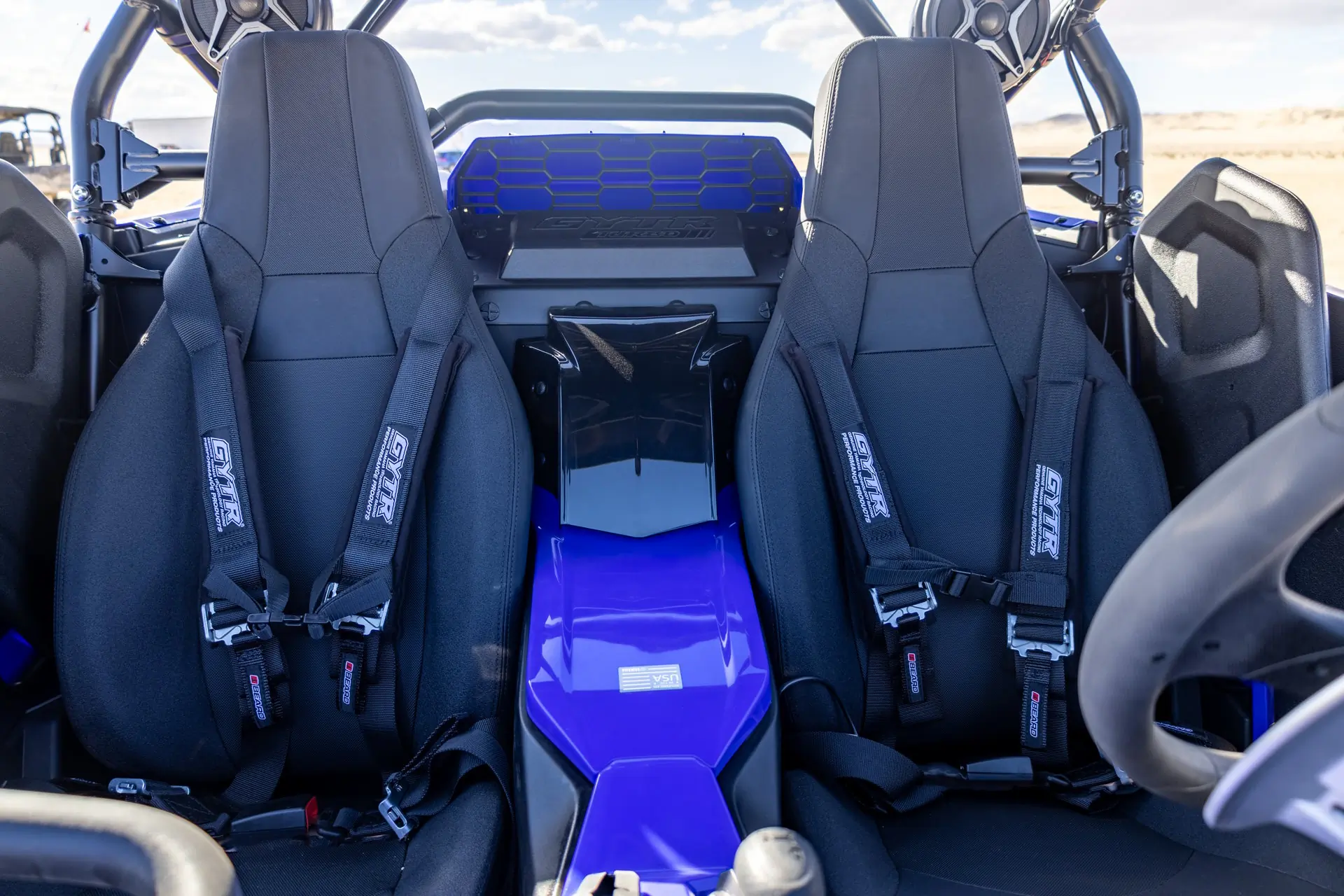



The main one is between the seats. There are two side intakes on the back that can work around an accessory cargo box. Another is under the cargo bed. So, the radiator will pull air up and over the SxS and through the cargo bed — a clever articulation.
A downside to moving the radiator to the back was some loss of cargo space. You can no longer lay a spare tire flat in the cargo bed but Yamaha does offer an accessory spare tire carrier.
YXZ1000R SS Suspension
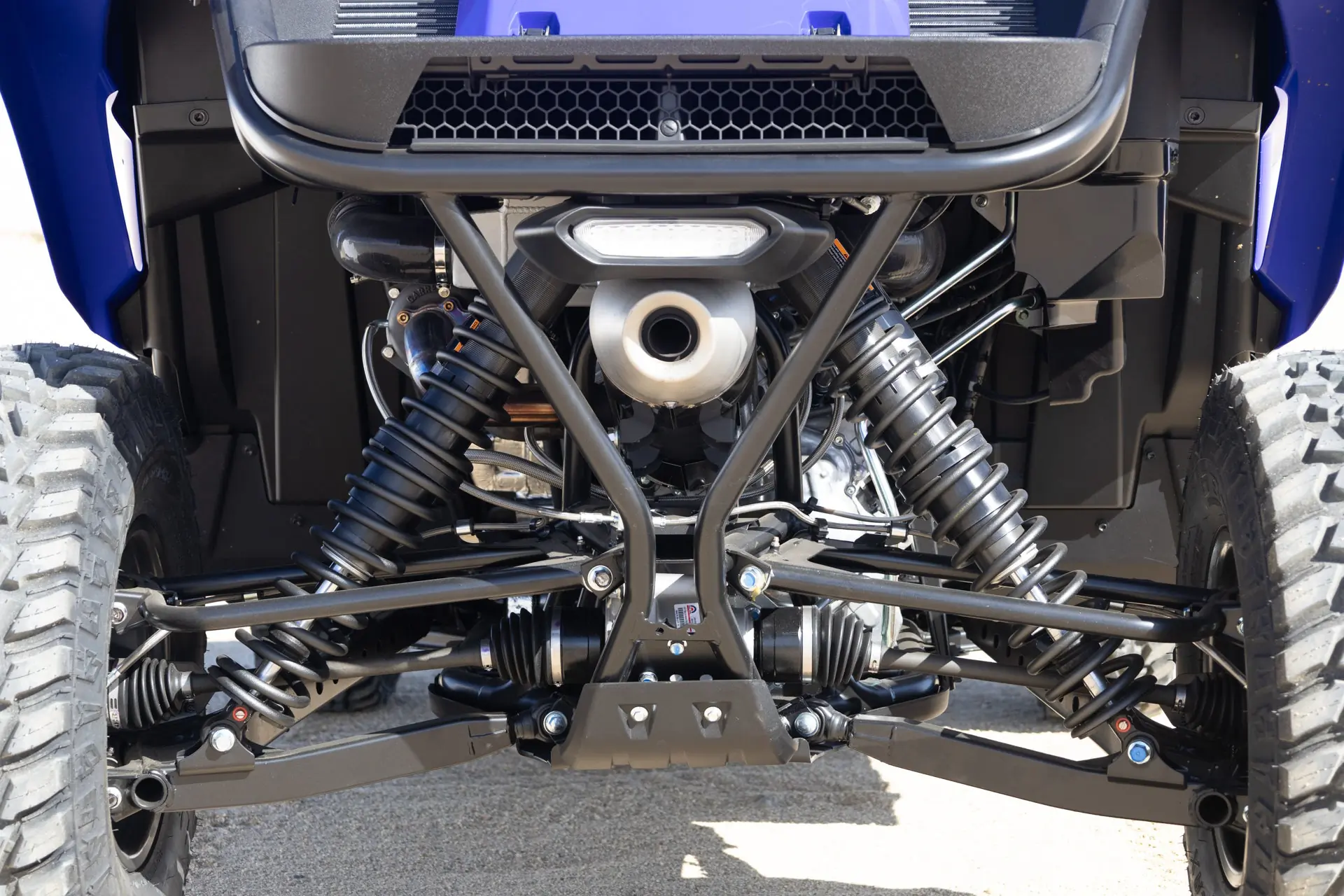



Yamaha believes most YXZ customers want a higher level of adjustability, which is why there is high- and low-speed compression damping adjustability and rebound damping control in the suspension system.
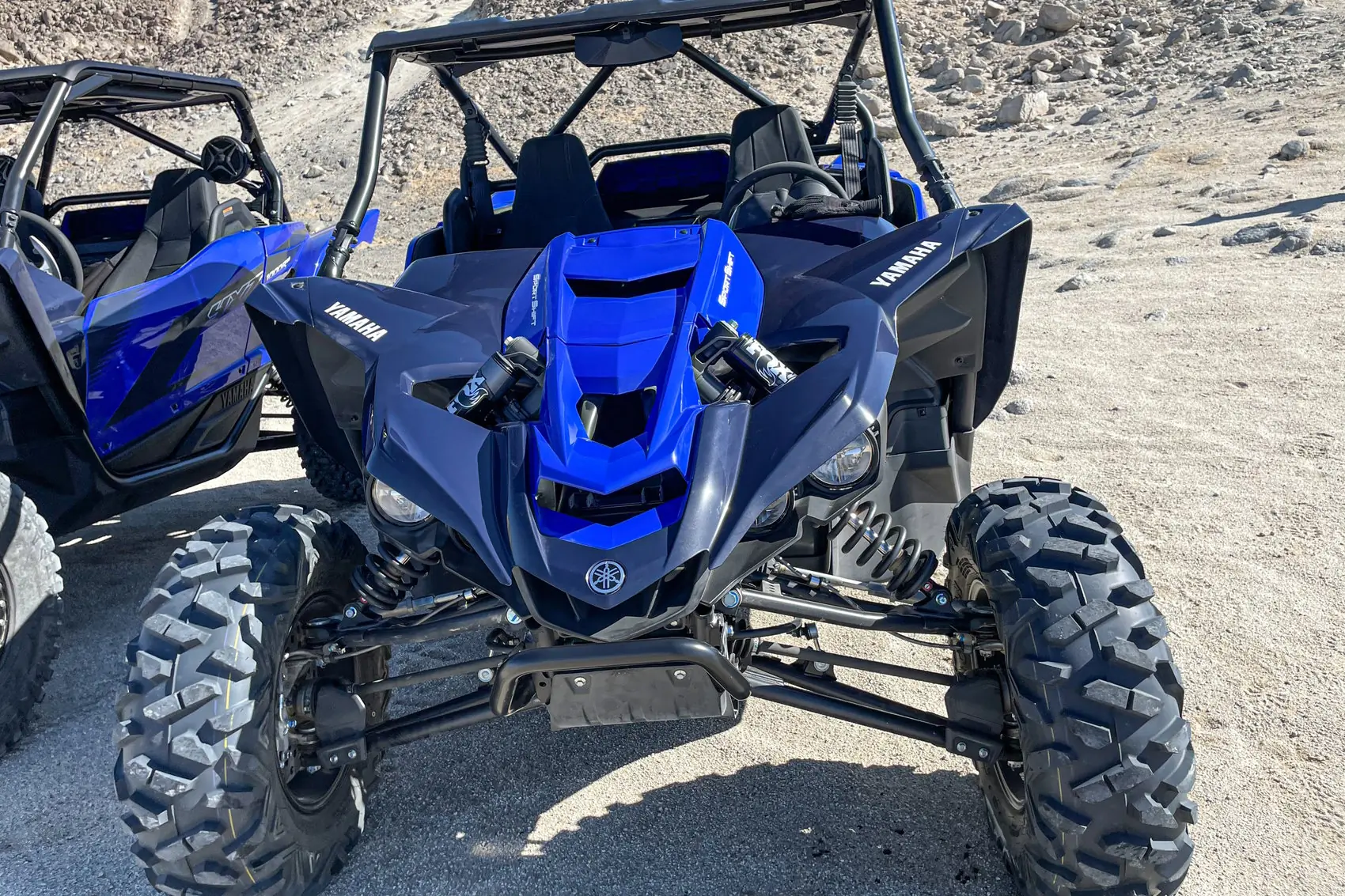



There are two options for spring adjustability for the YXZ. You can adjust the spring preload overall, and you can also adjust the crossover point between the two springs via the collar, which is only available on the YXZ from Yamaha. This adjustability is available on both the front and the rear suspension.
Tires Matter
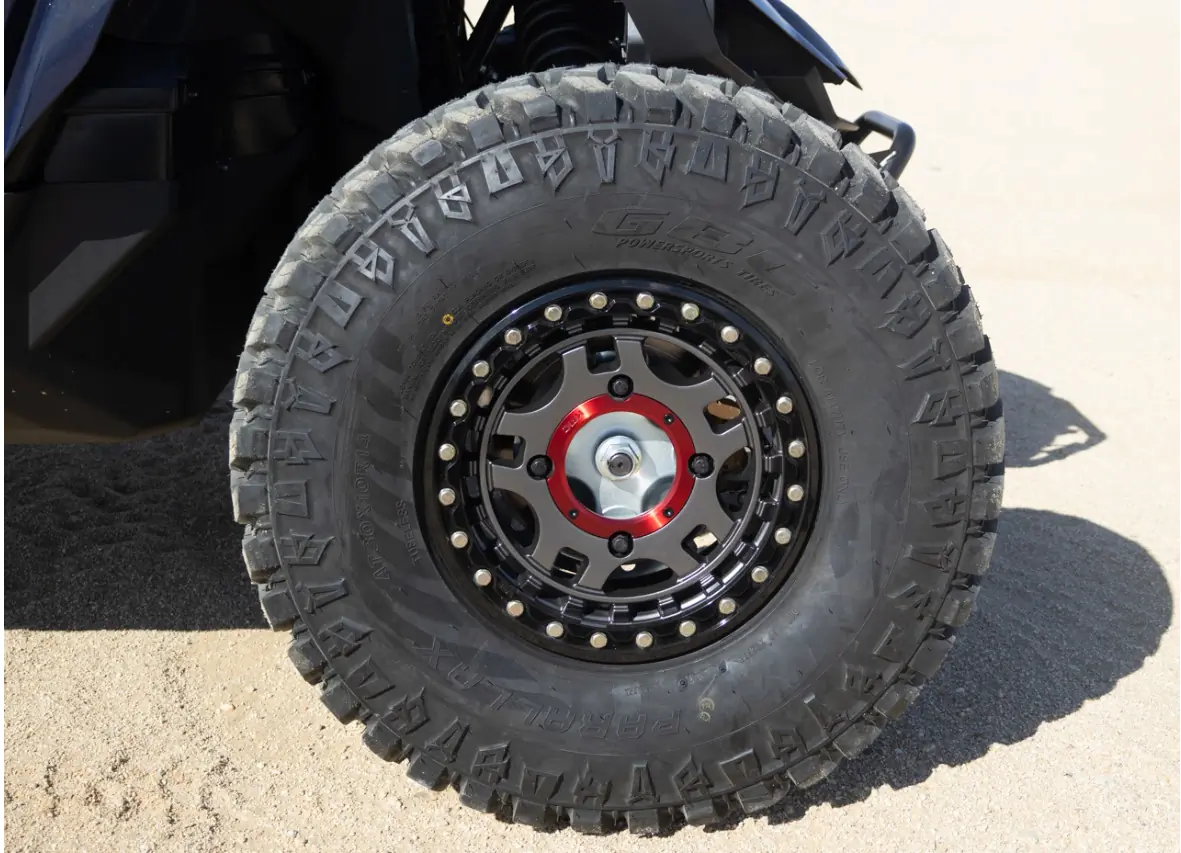



The 2023 YXZ runs on Maxxis Bighorns, which have been around for a while and have a great reputation in the UTV market. Maxxis has the ideal tread pattern for hard desert, soft sand, and aggressive rocks.
For 2019 and later, Yamaha has added a 29-inch tire that’s eight-ply rated — great for limiting side wall pinch between a rock and the rim.
Downsides to the YXZ
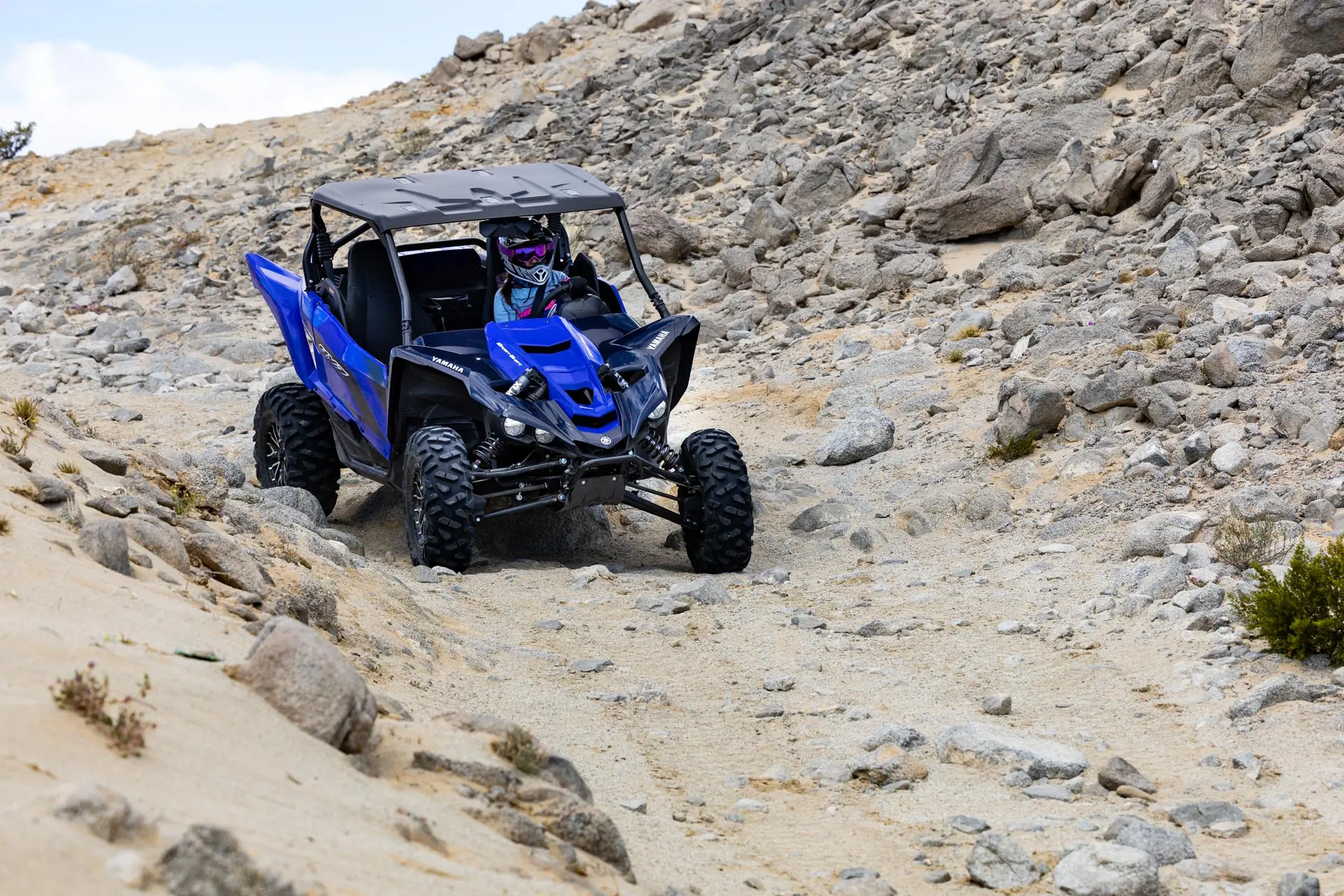



Without an automatic transmission, the YXZ felt a lot jerkier at first than the smooth-driving RMAX2 1000. It took some time to get acquainted with the sweet spot on the YXZ.
My foot on the pedal seemed to either be too heavy or too light when rock crawling or grinding up steep terrain at slower speeds.
After a short while, transitioning between the gears became smoother. The rev-limiter prevents drivers from revving the engine too high, and an auto-downshift function keeps you in the most appropriate gear if you’re slowing down and/or coming to a stop and forget to downshift (which simultaneously preserves the clutch). There’s also a green half-clutch light that will let you know if and when the clutch is engaged, if you’re driving at a very slow speed, for instance.
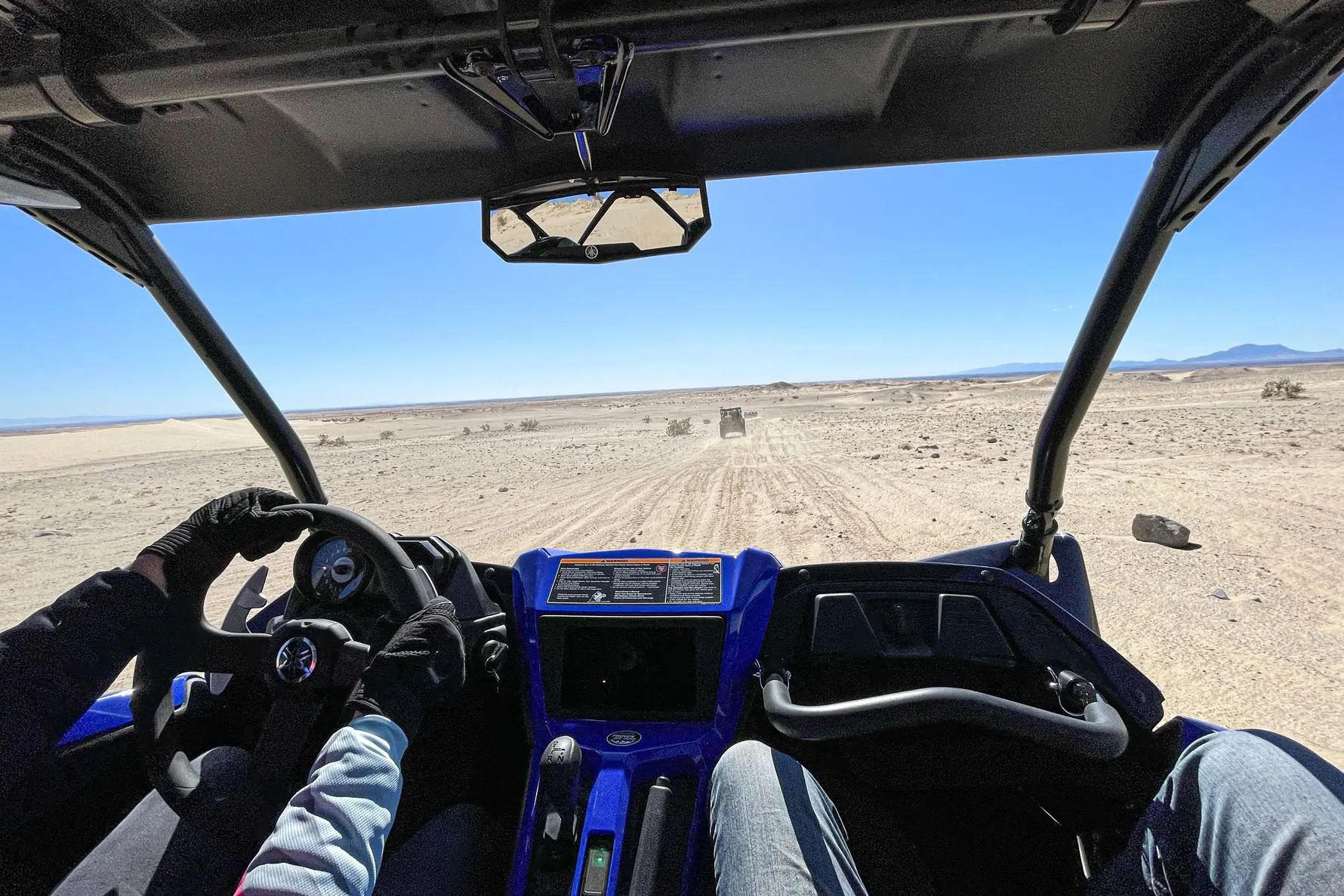



What didn’t sort itself out was my position in the cockpit. At 5’6”, I felt the seat and steering were designed for taller people. Even after making adjustments, I still had to reach for the steering wheel and was constantly leaning forward, which increased my neck and shoulder fatigue.
If you’re short but have longer limbs than me, you likely won’t notice the discrepancy.
The reach issue also came into play when I hit speeds over 45 mph. As I couldn’t lean against the headrest, I was straining against the velocity. A windshield accessory could help with this.
Two small additional cons: One, the seatbelt gets stuck behind the shoulder bolster. There’s some fumbling involved when reaching for it after getting in. Two, there’s a tendency to push off the center console when getting in and out of the machine. The light plastic covering felt like it could easily crack under heavy pressure.
YXZ1000R SS With Turbo Kit Accessory
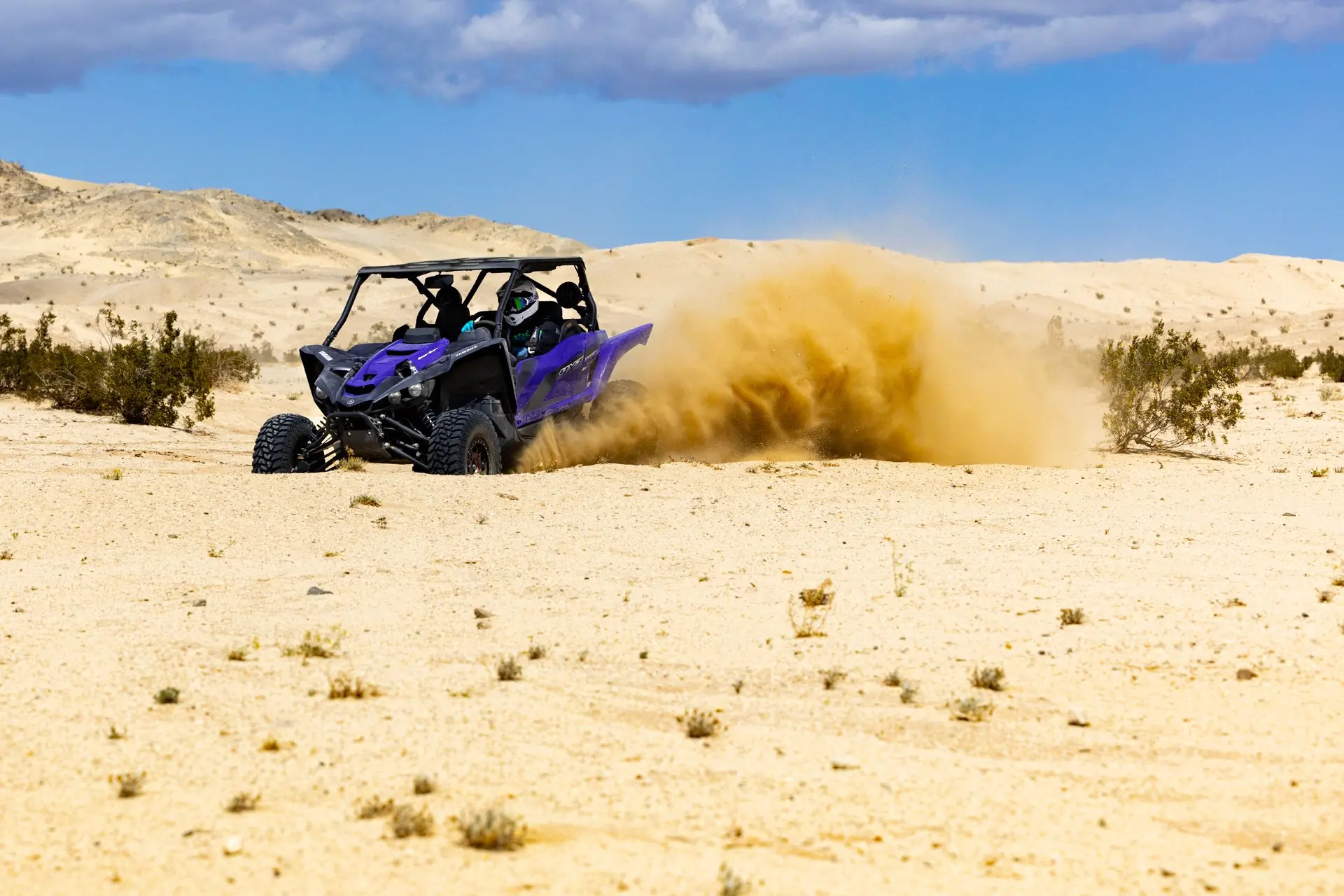



Adding the Genuine Yamaha Technology Racing (GYTR) Turbo Kit will turn your YXZ into a nimble little race car.
With a 60% horsepower increase and Garrett GT2554R ball-bearing turbo for power gains within the rpm range, I can’t think of a good reason why not to add it. Except maybe the price.
But for $6,299, you are getting a lot of top-quality features with the Turbo Kit.
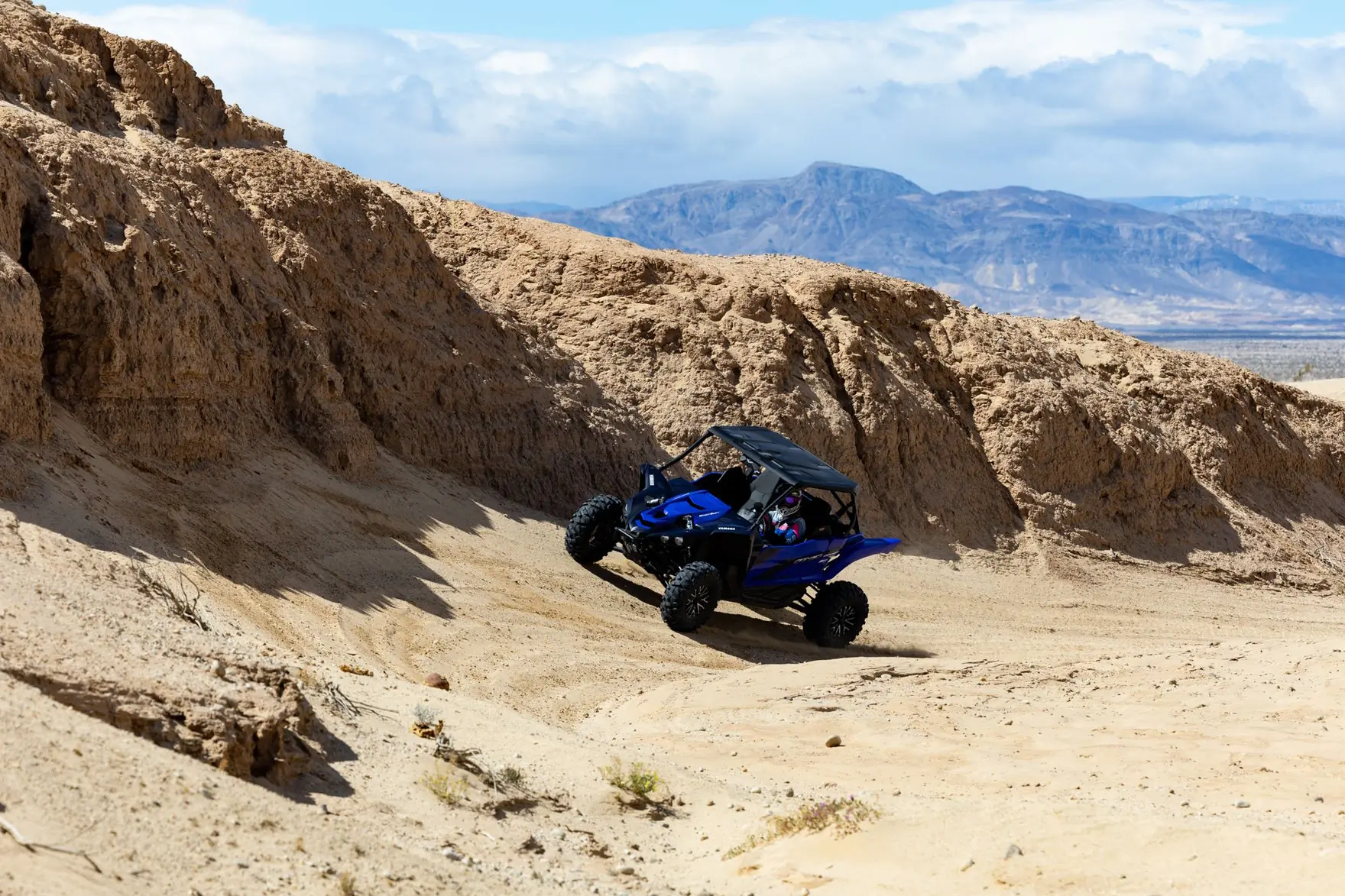



Along with the aforementioned 60% increase in peak power over stock, the Turbo Kit includes:
- Garrett GT2554R liquid-cooled ball-bearing turbo
- Preprogrammed plug-and-play ECU
- Easy-to-install highly efficient water-to-air intercooler
- SAE 310S cast stainless steel exhaust manifold
- Lightweight molded-silicone intake
- High flow air box features a GYTR-branded lid and easy, tool-free air filter access
- Heightened turbo whistle sound
- Relocated water pump: easier to service, bleed, and install
The kit is EPA-compliant and recreational-focused. You can use the Turbo Kit in all 50 states and it maintains the emissions equipment and the Yamaha standard.
Note: Adding the Turbo Kit requires using premium 91-octane gas.
Why 60% Instead of an Actual Number?
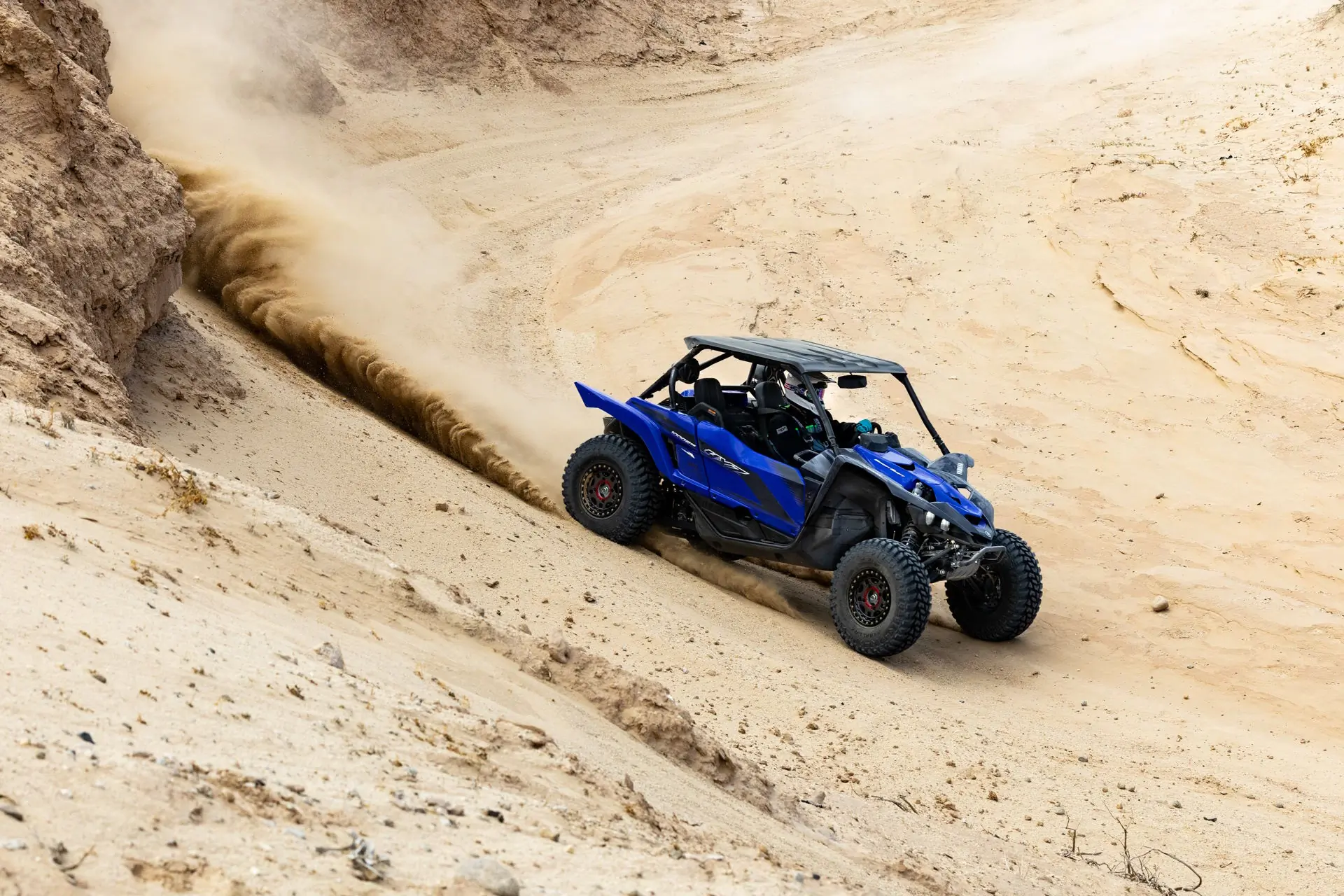



Adding the Turbo Kit gives the YXZ a 60% increase in peak horsepower. Due to a myriad of variables, Yamaha doesn’t provide top-speed numbers, but a stock YXZ can go 70-plus mph.
Why a percent and not a number? Yamaha says the reason they do this is to be accurate and not just give customers a design number.
For those with access to a rear wheel dyno, Yamaha gives you a percent because different dynos can make a huge difference in that number. There are also a myriad of different situations that can affect the dyno numbers, such as temperature, barometric pressure, elevation, etc.
Therefore, based on whatever dyno readout you get, the GYTR Turbo Kit will provide at least a 60% increase in power from there. This way, you know what you started with versus what you’ll end with after bolting the GYTR Turbo Kit to the YXZ. The Turbo Kit will add about 75 pounds to the 1,532-pound YXZ1000R SS’s wet weight.
Additional Accessories That Can Be Added to the YXZ1000R SS
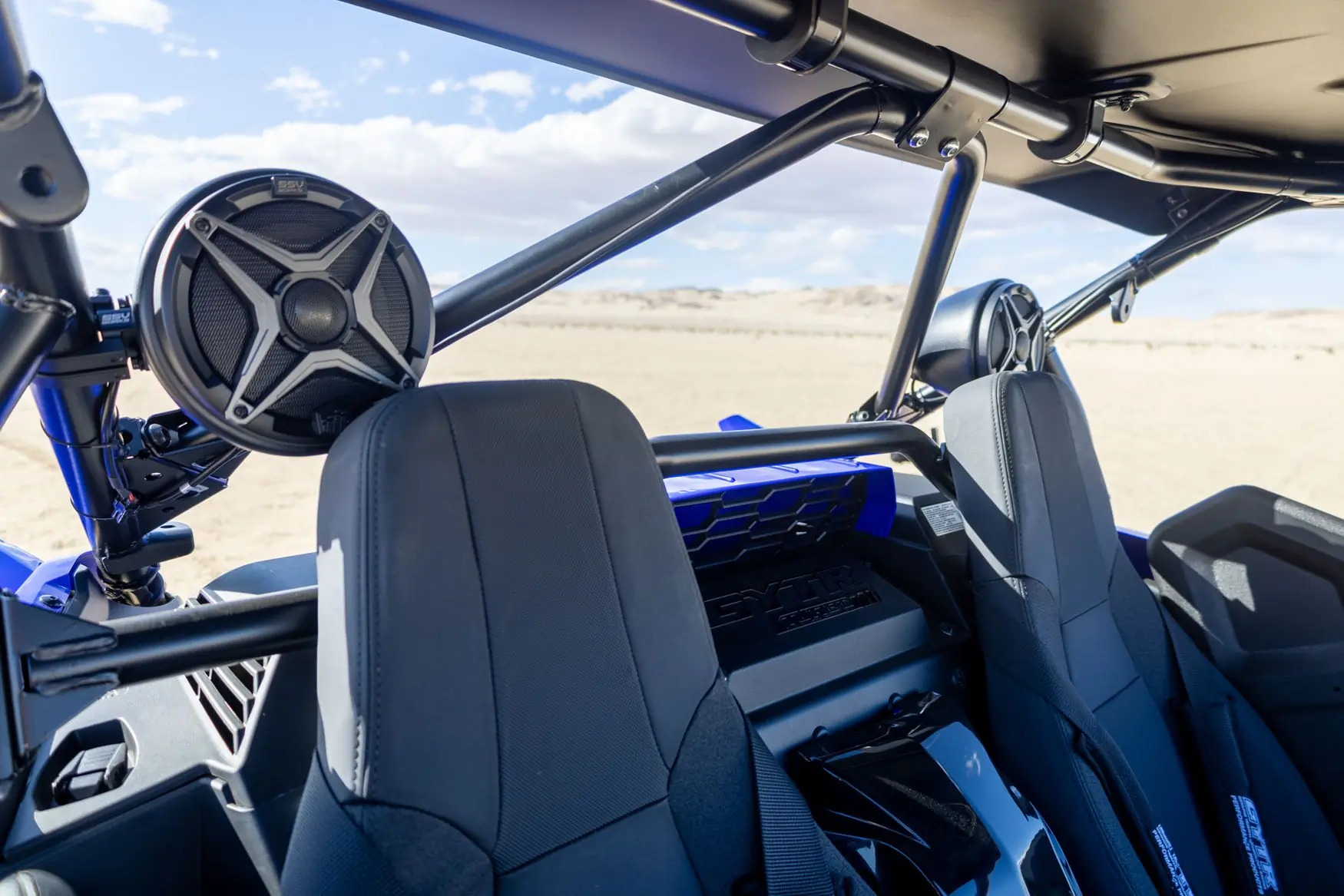



- Overhead audio system
- Powered subwoofer
- Rear speaker pods
- 4-point harness kit
- Second battery kit
2023 Yamaha YXZ1000R SS Review: Wrapup
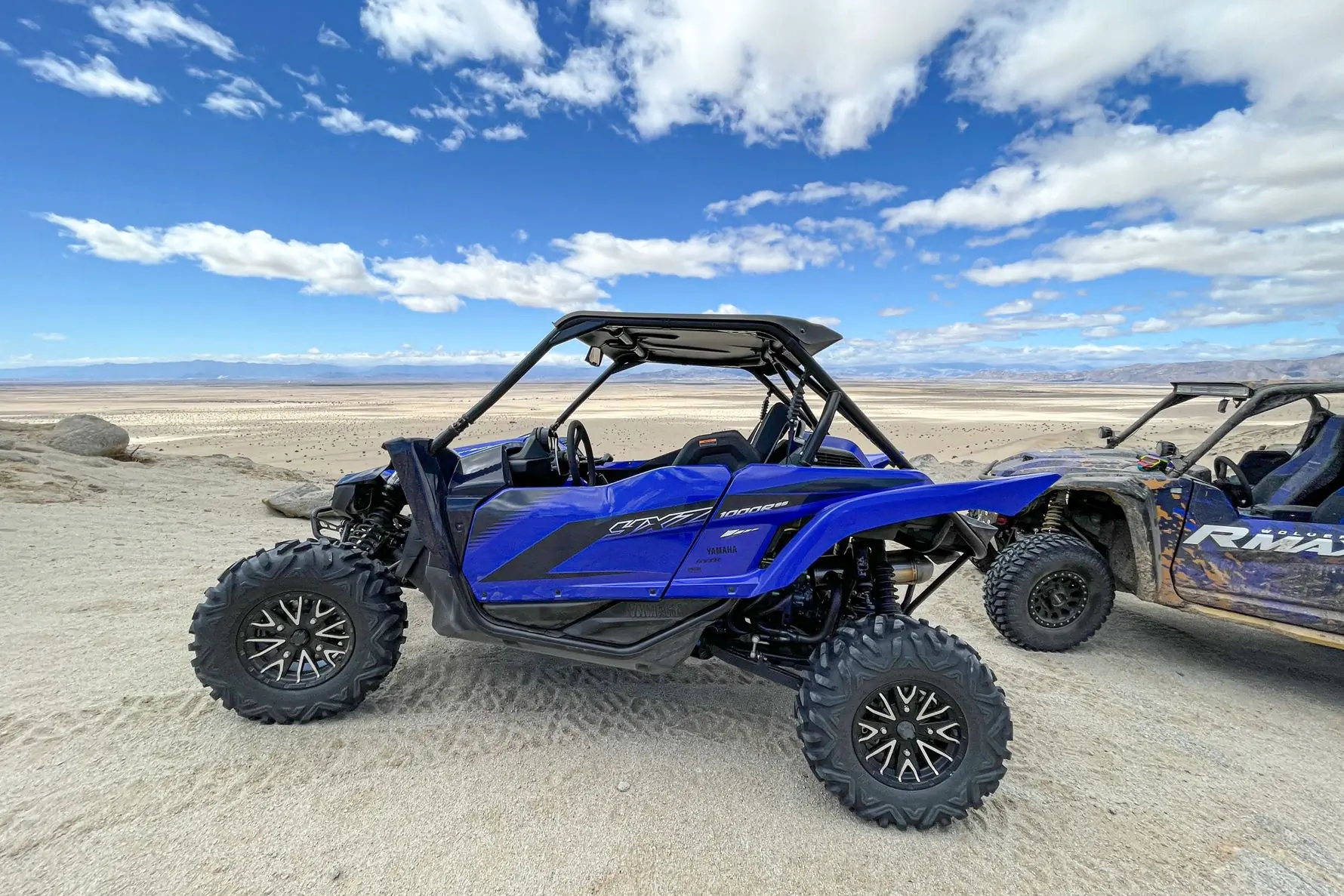



Once I got used to it, I can honestly say the YXZ1000R SS was a heck of a lot of fun. I confidently cranked the wheel and mashed the gas pedal without concern of a rollover or stalling the machine on an uphill climb.
If you want to stand out at Glamis, Superstition, or anywhere, the YXZ1000R SS will definitely turn some heads, especially with the turbo kit.
The YXZ1000R SS starts at $21,899. Adding the GYTR Turbo Kit is an additional $6,299, plus any dealer installation charges.
